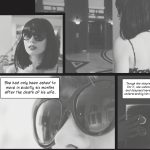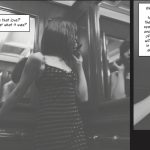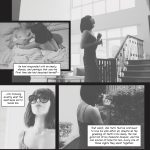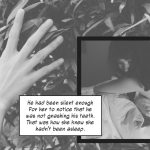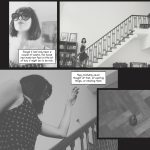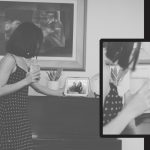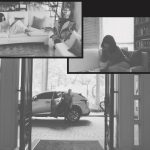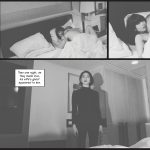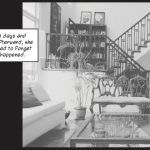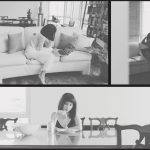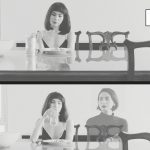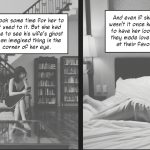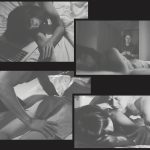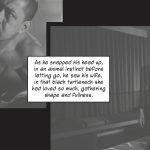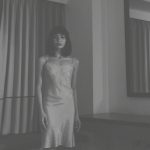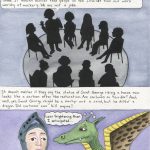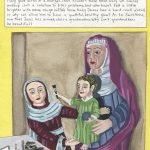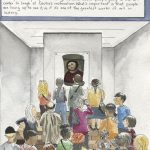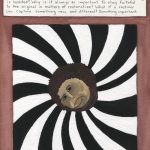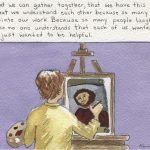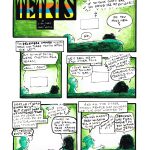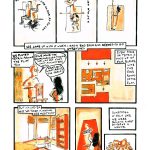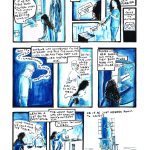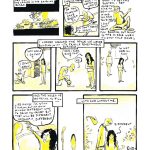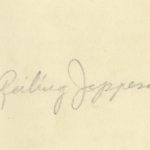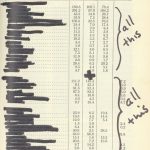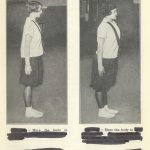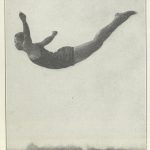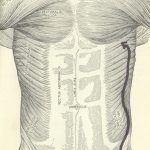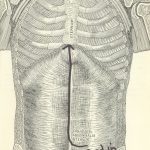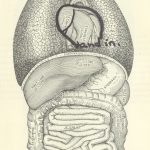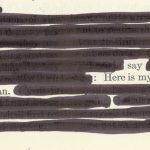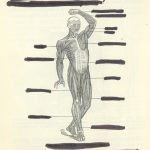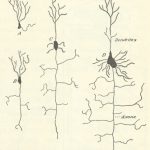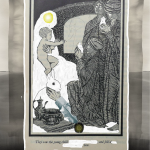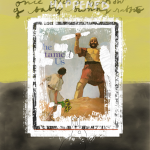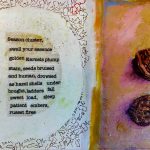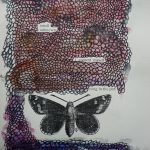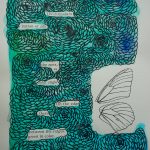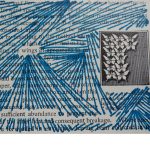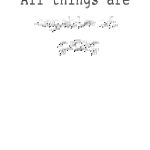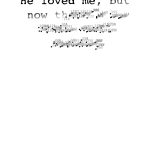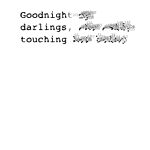Category: Aquifer
Elegy for My Father

When he died last month at 91, my dad left boxes and boxes of black-and-white, sepia, and tinted photographs, along with a mahogany crucifix on which the Virgin Mary is suspended. Black hair, probably a horse’s, flows from the Virgin’s scalp and skirts her narrow waist; she has two tiny discs of grey-veined mica for eyes; and her feet are malformed, curving outward like jester shoes. I’d never seen this figurine in my life. I found it in Dad’s pocket a few hours after he died. The oddest thing, however, is that—whether it’s a fault of the woodworker, an act of vandalism, or a consequence of one of my father’s devious moods—the Virgin’s right breast is missing. The left side has an oval hump; but the right side is flat, smooth, and palely smudged as though rubbed vigorously with sandpaper. Along the back of the cross is carved: “To Amelia, from Dad.”
We shared many irreverent jokes; neither of us were orthodox Christians. But this figurine, I admit, makes me uneasy. Why is her breast sanded down? Can a single object inflect the narrative of an entire life?
Dad loved dolls, that I knew. He was the only man I’d ever met who kept an extensive collection of them—enough to fill an entire closet. As a child, I could never step foot in that uncanny sanctuary (or, to my mind, mausoleum) without chastisement; although at times, when he was out photographing the mountain landscapes and mountain people—the thing he loved to do above all others—I’d sneak in and caress their porcelain faces, turn their eyeballs to the left or right, or, when I was especially lonely, embrace them carefully without altering their positions.

There were big dolls and little dolls; conventional ones and quirky ones. I remember waiting for him in his Model T as early as nine years old while he hunted for dolls in drug stores and dusty furniture shops that made my allergies act up. The last doll he bought was in an antique store in Brevard, North Carolina; it was gigantic, dark-haired, with arms as pale and thick as split oak slats (I don’t know why this doll, in particular, finally satisfied his collector’s heart and completed his coven). He photographed them all, but of this Virgin Mary there are no extant photographs.
Dad was what you might call a shutterbug. He conceived of life as an album of images. His memories, for the most part, were tied to particular photographs he’d taken at one time or another. He entered Kodak contests and lost them. He wrote Kodak often complaining about their overrepresentation of northern urban photographers and the relative neglect of southern rural ones in contests; he wrote them about their new products; he wrote them about copyright law. I remember falling asleep to the ring-clack and furious metallic swings and snaps of the typewriter.
In the 1920s and ’30s, during the decline of tenant farming and in the heyday of folk photography, each town or hamlet in rural America had its resident photographer (Dad was born in 1889 and I in 1909). Men and women from Hemlock Cove, Olto, Judaculla, and Gallow Hollow frequented Dad’s studio and the Attic Window darkroom. They’d come with baskets of huckleberries, lovely foot-high April morels, and birch sap candy especially for me. They had names like Mossie Reynard, Earl Palmer, Gideon Laney, Imogene Bascom, Reinfried Romanes, and Max Straub. Like my dad, none of them made a splash in the photography world. At best they placed a few pictures in the Atlanta Journal or Audubon magazine. But Dad never kept friends long. He’d get into some bitter dispute with them about aesthetics or the superiority of a particular strain of vegetable. He had so many of these short-lived artist friends who shared and exchanged photographs with him that it’s impossible for me to know which of the tens of thousands of photographs he left behind are in fact his. The overwhelming majority are, certainly, but the outliers I can’t identify. My eye isn’t sharp enough and perhaps his style wasn’t distinct enough.
Throughout our lives, Dad and I would venture to the obscurest regions of our property, which was five square miles of oak, creek, and granite dome. He called our home in the cove Amelia’s World, because I spent all my time there gardening, walking, and writing while he was off taking pictures. We’d search for lonely abandoned chimneys from the nineteenth century—the relics of the crude cabins of Cherokee and frontiersmen, which often tilted dramatically on uneven ground. These one can find all over western North Carolina, hidden in rhododendron coves: creek rocks rising twelve feet high layered with clay chinking and reinforced with rope, hair, and hog’s blood; the splintered horizontal slats made of poplar. Over time, bees bored into the chinking’s hard pottery. Sometimes we’d light a fire in one of these crumbling hearths and smoke would pour out of the holes.

Dad’s death was a painful one. It feels almost irreverent to speak of it. The few distant cousins who visited struggled to keep their hands from their faces. He had bulging sores resembling purple tomatoes, some split open and oozing as if struck by the blight. His body was like a neglected garden at the onset of winter. I dabbed his sores with a cold cloth day and night during the final struggles. His last wish was for me to cover him with his dolls. His face glowed as he tossed and turned, coughing, spitting up fluid and blood; it jutted out from the top of the porcelain and cotton bodies so that it seemed he wore a grand, puffy Elizabethan dress with ivory lacework.
Dad had many sayings: “the best and worst things in life are errors of the stars”; “we’re just searching for a lucid interval”; “our knowledge is a journey from ruin to ruin.” These cryptic maxims I’ve found myself pondering in the days since his death. Over time, we came to share a similar philosophy. We believed travel outside Appalachia, for instance, would not edify the mind. Close observation of oneself and one’s immediate surroundings is the key to parting the curtains of mystery, however briefly; sense impressions decay into a precarious reality and the laws of nature can change at any moment. But we never held our breath awaiting those changes.
Some of his quirks I picked up. We both preferred corncob pipes with bowls cured with apple butter; it made the brightleaf tobacco from our garden taste sweeter and heavier than molasses (I’m smoking an old corncob right now at my writing desk; my hand shakes more than in the past and I pull the smoke with less vigor, but I experience the same relish as in my early adulthood). Neither Dad nor I owned a mirror. On the rare occasions we looked at our reflections, we did so in the convexities of tablespoons, and only then out of a sense of curiosity, never vanity or self-critique. We should move through life, Dad said, like a living soul in love that knows it’s loved in return, that doesn’t desire more or less as it stands on the bridge between self and other. That was his roundabout way of saying that we should accept our insignificant selves as they are.
I remember the winter it snowed and never let up, the flakes hissing and shifting on the branches, rocks, and roofs. In a fit of rage one day, due to some accident in the darkroom that ruined a batch of prints, Dad threw his ice-crusted walking stick against the wall—and it’s still stuck there. Somehow the tip wedged perfectly between two boards. We thought it quaint to leave it. In later years the walking stick reminded us of that long brutal winter and cut us with nostalgia, remembering the faerie cabins we built with pebbles and bark; the chunks of granite we heated in the stove and used to warm our feet; the icy shock of creek water in our throats; the night we glimpsed a freak offshoot of the northern lights weaving blue and violet nets around the moon; our midnight feasts on crystallized honey; and reading the Gospel of Thomas aloud until we drifted to sleep.

Living with Dad was not always easy. Rarely did we get on each other’s nerves, but there were times, especially towards the end, when he’d come in needy and sulking, desiring compliments. For sixty-plus years we’d discussed the people and places he photographed and the prints he left lying about the kitchen counter or that he had genuine questions about, which my untrained eye could help him clarify. When his body and spirit began to fray, however, he started leaving
photographs in places I’d find when I was alone: on my writing desk, bedspread, and rocking chair; in my tackle box, where I kept my rocks; and in my jewelry box, where I kept some beloved, much-read letters from an old flame. In the garden I once found a Polaroid caught in corn silk. It was a portrait of a woman I’d never met. She had sensuous lips that turned down at the ends and a bold beautiful forehead. Her eyes were closed; a horny crust, some kind of skin condition, populated her eyelids. The next day Dad asked me about it. Was it good or bad? Should he submit it to a magazine?
The first few times he did this I told him how moving the photographs were. I patted him on the back and flicked him affectionately on his balding pate. But as time passed, it angered me that he wanted me constantly to be his praiser and applauder, his confidant in art’s triumphs, failures, and transgressions. I wanted nothing more than the communion of easy laughter and the intimacy of long silence. That was how it had always been. It hurt to alter my attitude toward him, to play a role other than daughter. In the final two years his liberal spiritual convictions began to wear thin, and I suspected he was becoming secretly zealous in a manner he was embarrassed to admit to me, given our long history of unorthodoxy and light heresies. He’d hide himself away in his workshop reading a copy of the New Testament that he’d picked up at the Baptist church down the road. Once, when he lost his pipe, and we couldn’t find it anywhere in the cabin, I heard him mutter: “My God, why hast thou forsaken me?” I laughed. I thought it was a joke, but his expression was solemn. In spite of these things—which I’ve hesitated to commit to paper—he was my only friend and would’ve carried the cross or burned for me. An elegy, unlike a eulogy, should be honest in its longing for souls no longer in reach and should not shirk the hard truths of a complex life.
On the end table, there’s a browning, half-eaten peach with Dad’s bite mark still intact. I can’t throw it away. I think of how often he fretted, especially after he turned eighty, that all the peach trees in North Carolina were dying. He carefully documented their mutilations after the April freeze. He didn’t go exploring the mountains and rivers as far as Asheville anymore, but stayed near Amelia’s World, beekeeping, making muscadine wine, and worrying over our failing orchard. He often related dreams of worms, molds, and hard white blights like baby teeth infesting the fruit.

For some reason I can’t help but connect the missing flesh from this half-eaten peach—where Dad’s long, rabbit-like teeth scored as deep as the stone—with the Virgin Mary’s missing breast; and I can’t help but connect her missing breast to my motherless life. Of all people to have no photographs of, I have none of Mother (never “Mom”). Dad took hundreds of the goat man who visited the byways of Appalachia once a year in his junk-filled wagon pulled by goats; he has thousands—literally thousands—of pictures of purple martins feeding their young from perches in hollowed-out gourds hanging from poles. None, however, of Mother. Dad only started documenting the still, silent world after her death; in his photographs, the mysteries of loss were lulled into chemical innocence.
Mother passed away a few weeks after childbirth when I was two years old (my brother was stillborn). I was too small to remember her. Like clockwork, once a month (during the entire seventy-one years I lived with Dad, up until those final weeks), I’d walk into the house to find him drinking sassafras tea in the kitchen and crying, almost silently, his shoulders heaving. Few things made me so uncomfortable. It transformed me into his parent. I’d always pretend I didn’t see and pass quickly through the room. He never detained me but once. On that particular evening he spoke about Mother, how she had been feverish before she died. She didn’t rave exactly; she was lucid, just bathed in sweat and bright-eyed. She related certain visions: Christ in the desert, hovering, suspended in the air by magnets; a fiery cross erupting on the forehead of a goat; breaking a rock and seeing the face of Jesus inside it. The last vision she related, however, was more intimate.
She told of a day in Oberwolfach in southern Germany, the evening before she and Dad started their long journey to America. They’d decided not to go walking in the windy autumn hills above the village. She couldn’t remember why they’d stayed indoors; maybe they needed more time to pack. But in her vision they had, indeed, gone walking in the hills that day; they’d held hands; they’d kissed each other’s imperfections; they’d talked about what North Carolina might be like as they made for a gap in the trees, where the sun flooded the dim evergreen forest like a bomb’s light.

Dad, you were good to me. You were strong and gentle and careful as a mother. I’m a seventy-one-year-old woman now. When I smile the hundreds of wrinkles on my face hurt like paper cuts. It’s a testament to you that I have no fear of the darkness or the light. As I rotate this effigy of the Virgin Mary back and forth under candlelight, I want to glean more details, to see its mica eyes flash at me. I know that this object is some kind of provocation from you; a sign that I should rethink my life, my past and future, even at this late stage. It makes me wonder what other secrets you kept from me in that red-lit darkroom and in that closet of dolls, which did not replace me, exactly, but acted as a surrogate for something I can’t understand. What perversions, mean hates, and desires so naive and saccharine as to be almost scandalous did you hide from me? And where shall I go now? What shall I do? If I crack open the Virgin’s wooden skull, will there be a ball of mica inside it, a mineral brain not so different from my own? Will a thought rise from it like smoke?
The sky is the dark orange of persimmon beer as I finish this elegy. Orion, the hunter constellation, sparkles along the trees but Sirius has yet to appear above the hill. Perhaps I have twenty more years left, and I’ll die at 91, just like you. But with this inexplicable figurine in my hand, what tables shall I turn to honor, spite, or abandon you? Is the Virgin a key to open the kingdom within?
Jam Session in Poems
Cross Country, by Jeff Newberry and Justin Evans
WordTech Editions, 2019
Paperback, 110 pages, $19

In Cross Country, a collaborative book of epistolary poems published by WordTech Editions (2019), Jeff Newberry and Justin Evans pay homage to poet Richard Hugo. Hugo’s 31 Letters and 13 Dreams (1977) popularizes an epistolary tradition that originates in Ancient Rome and finds acclaim with Horace and Ovid. Hugo’s poems often address other poets such as Charles Simic, William Matthews, Denise Levertov, and William Stafford. Readers become voyeurs, dropped into intimate conversations between some of the most prominent poets of the twentieth century.
Hugo’s poems are often imagistic reports of a place, as he writes in “Letter to Wagoner from Port Townsend”: “Dear Dave: Rain five days and I love it.” These epistles transcend the reportage of place idiosyncrasies to reveal Hugo’s vulnerabilities and anxieties—both about himself as well as the world around him. In “Letter to Bell from Missoula,” Hugo writes: “Months since I left broke down and sobbing / in the parking lot, grateful for the depth / of your understanding […].” It is this balance of the specific details of a place with the personal thoughts of a brilliant writer and flawed human that has been so appealing to Hugo’s readers over many years.
In Hugo’s letter poems, we are only privy to one side of the conversation, however. We do not know how the addressees respond to Hugo—or if they respond at all. Hugo’s epistolary poems are decidedly one-sided; Newberry’s and Evans’ Cross Country, however, is a mutual conversation where both poets relay their deepest fears, desires, and hopes—to each other and to their lucky readers.
Evans sets the stage for Cross Country in one of the earliest poems in the book, “Letter to Newberry about Past Memories of Colorado”: “Dear Jeff: I think we’re all looking / for something, looking to run / to or from something.” Indeed, Cross Country feels like a search for a meaningful spiritual faith, for familial acceptance, and for a way to exist in a contemporary world that often seems mired in violence, sadness, and a persistent irrationality. This is a book that emerges from a contemporary scene that includes the mass shootings in Sandy Hook and Orlando and the 2016 presidential election, but it is also a book that asks looming personal and philosophical questions about love and loss, a book where we “want to see the mystery unfold, / complex as it might be” (Evans).
Evans and Newberry allow readers to see them at their most vulnerable—particularly when they broach the topics of their children, as well as of their own fathers. In a particularly tender sequence entitled “Letter to Evans: Like Waves Breaking,” Newberry describes his fears about his young daughter’s spina bifida, and ends the poem by writing: “I take each breath with her, willing my lungs / do the work for her. She sleeps and I sleep.” Newberry’s helplessness is profound, but it is in moments such as this one where a subsequent poem from Evans acknowledges Newberry’s anxiety and empathizes with him: “As a father myself, I / understand what you are saying, though / I cannot know the specifics of your fears” (Evans). The dialogue that Evans and Newberry create in Cross Country is deeply moving precisely because in it they engage fully in the difficulties of each other’s lives and offer each other comfort and solace.
If literature’s job is to teach us what it means to be human and how to empathize with one another, then Cross Country delivers those lessons in honest and accessible poems. Evans’ and Newberry’s narratives weave in and out of each other organically. It seems as though we are present at a blues jam session where the musicians have known each other for so long that they finish each other’s riffs. In fact, in the penultimate poem of the book, Newberry writes, “Justin, when you unseal this poem, remember / that it is made of voice the way that music is made / from the guitar player’s deft fingers.” The music in Cross Country will break your heart. Just like the greatest songs, though, these poems also sound the bells of hope and grit because, as Evans reminds us, “We must each / set the bar each morning as we greet the new day, / as each new day is certain to find us, willing or not.”
Trauma Bond in March: After the Miscarriage
for Chelsea
The tulips have flowered too early.
I cover the beds in white sheets
to keep them warm.
Frost pulled down from the stars
will soften
into a remembering
by morning. I am no mother
to the flowers or anyone.
It’s spring
and the world feels more delicate
than before.
Winter clipped. New wings lifting.
Doves adoring the sound
of their own song.
I have been told
some plants bloom once then die.
Flight is the answer,
though water can be an answer too.
Everybody (body) a vanishing act.
Seed without root.
And now the petals fall,
wishes to love
and love-me-not.
And now, the sound of distant laughter
enters my open window,
like ghosts. Softer now,
gentle weight of these small bones.
The Beheaded (or, A Sward for the Disembodied)
The French aristocrats persist in their delusions of grandeur, confirming they learned nothing from their cart rides to the guillotine. They revel in their precise necklines and pooh-pooh without decorum those like the Inca with ragged tears from a puma’s claw and the turbaned apostate with saw marks from a scimitar not properly sharpened. Some even grunt or humph on occasion as though still in touch with their upper-class gastronomic disorders. A few of the other heads may suffer now and then from phantom torso, but clearly these aristocrats are putting on airs of self-importance.
Roundabout a gross in all, these heads loiter in the grass like a gaggle of free-range bowling balls. The only criterion for membership is the complete separation of one’s neck from the body, intentional or no. The uneven ground ranges off in all directions into an unfathomable dark they have not the capacity to plumb. The grass itself is downy and kempt, not unpleasant to reside in, provided one is not vulnerable to oral, nasal, optical or aural intrusion. New arrivals drop from the murky haze that serves as sky and plop into available space. Thankfully, there is no pool-balling, but the way one lands is generally one’s position for the tenure of this after-existence. Thus, the fenstermaker, struck off during a freak installation accident, lies idly on his cheek, free to engage in idle conversation, while Nazi doctor Horst Fischer, facedown, can do little but mumble (to the relief of his adjacents). Rosalind Thorpe, the Co-Ed Butcher’s fifth victim, landed similarly but was industrious enough to tongue her way onto her ear. She beams with accomplishment when she hears the Nazi’s muttering, until memories of that which initiated her into this place sets her eyes quaking like jelly globs.
But before an arrival can have available space, a cranium needs to pop out of existence. They do so like bubbles, leaving behind neither trace nor debris. Neither arrivals nor departures go by any discernible logic. Jayne Mansfield arrived well after David Pearl, a seemingly beneficial swap at first, but her lack of bosom made Jayne quite the bore. She subsequently popped to make way for a Saudi extremist spouting pro-democratic slogans. Yet the ancient samurai remains, as well as the aforementioned Inca, who flares his septal bamboo when anyone makes eye contact for too long.
Their arrangement also seems indiscriminate. The aristocrats, for example, have but one trio in proximity, while the others reside singly among those they scoff. A cotton slave done in by overenthusiastic lynching glares at the aforementioned Herr Doktor. John the Baptist lies face-to-face with a Viking, the samurai alongside a poor kid who got truncated by the world’s tallest waterslide. Yet Medusa, her petrification skills as limp as her serpent tresses, is seemingly attended to by Henry VIII’s executed wives. The Greek is the only one who balances on the base of her neck, which in truth is the most level of them all, having been excised by deific steel, so she stands (metaphorically speaking) as though surveying the landscape, Anne B. and Catherine H. oriented well enough to watch over that which extends beyond their lady’s periphery. Some figure her snakes might not have been deceased when she first arrived and delivered her to her present position, but no one predates her arrival, so all hypotheses are the result of pure speculation.
The afterlife of decapitated heads is full of debate and skepticism. Belief is the number-one topic of conversation. What have they left but to question their surroundings?:
Who established this place? Does the choice of verb ‘establish’ load the question unfairly towards a God-based conclusion? The ordering of arrivals and departures, not following temporal logic, suggests some kind of selection is at play, but is that selection natural or super-thereof? Why doesn’t the grass grow, and why doesn’t it dry out since there’s never been a hint of rain or cloud ever from the caliginous expanse overhead? Could this place be the dream-invention of a single brain in the midst of its ninety seconds between separation and finality? Answers aren’t easy, even for those determined in their beliefs, pro- or anti-theist. If this were paradise, why subsist as heads alone? If punishment, what kind of Dantean contrapasso is at play? Discussions are curt and thankfully absent of palaver, for the wind of the bodiless is limited to their open-ended fragments of esophagus. Thus, they speak only in quick bursts, no more than two syllables at a time. A not atypical exchange:
“God.”
“Sure?”
“No doubt.”
“How?”
“Just look.”
The only exercise the beheaded are capable of anymore is to vacillate between despair and relief—relief that their existences didn’t just cut to black, despair that their continuation still contains no definite answers, their brains still boggled at the nature of things.
Though their distribution will vary according to the whimsy of arrivals and departures, overall they remain a hodgepodge of creeds and philosophies, from the standard repertoire to paganism to Wotan to rigid irreverence. The Viking considers a hall of heads the height of honor, while John the Baptist cries, “Repent! Repent!” Even John’s adherents, however, consider him unremittingly goody-goody.
A philosopher caught up in the Khmer Rouge revolution wonders if their situation is case and point of brains in a Cartesian vat, though even that conclusion necessitates further speculation on the placement of the evil daemon (or genius, depending on your translation). Joseph Haydn insists this existence a gift to promote the ultimate life of the mind, though he is considered something of an infidel, his decapitation done postmortem for phrenological purposes. The aristocrats spit and curse the name of Robespierre, but in their own way, being short of saliva and limited of wind. They wish him in their midst, for justice’s sake.
In the pale haze of sky, an unphased moon glows with persistence, making these crania shine like irradiated shrapnel in their lawn, or deep-sea pufferfish, aglow and uffing their jaws for life-giving water. Medusa and the former Mrs. Henry VIIIs look on without comment.
My First Time
in honor of International Women’s Day, March 8, 2020
The memory buzzes under
my skin like neon—in my young
twenties, before I understood
my daily risk of harassment
and humiliation, before I had
grievances, before I knew I was
entitled to grievances, I was
at the gynecologist, wrapped
in a johnny, lying down
on the examining table
for my first such exam,
knowing in the observing part
of my brain that a nurse
was supposed to be with me,
afraid of what the doctor
might find, and he entered
the room friendly, an older man,
asked me a few questions,
and then commanded, slide on
down here, Margot. I’m gonna
fill you full of cold steel.
No Brakes
In the spring of 1982, at the end of my senior year in high school, I was admitted to a mental hospital in Hartford, Connecticut, named the Institute of Living and was institutionalized there for two years. The Institute was founded in 1823, the first private mental hospital in the country. It was named the Hartford Retreat for the Insane and sat on thirty-acres on a hilltop above the Connecticut River. The first medical director was a brilliant young doctor, recently graduated from Yale, named Eli Todd. Whereas before, the mentally ill had been viewed as possessed, had been shackled, warehoused, or worse, Todd had a revolutionary vision for the humane treatment of the mentally ill: what he termed “moral treatment.” In Todd’s view, the mentally ill were citizens deserving of care and treatment and, ultimately, capable of rehabilitation and recovery. The key tenets of his treatment were “pleasant and peaceful surroundings, healthy diet, kindness, an established regimen, activities and entertainment, and appropriate medical attention.” “The great design of moral management,” Dr. Todd once said, “is to bring those faculties which yet remain sound to bear upon those which are diseased.”
I grew up in Hartford, often passing the Institute on Retreat Avenue in our wood-paneled station wagon. Driving by its imposing six-foot-high brick walls, my mother would comment, “There’s the country club.” And looking at those walls that surrounded the entire campus on all sides, I could imagine that it was a sort of English Tudor, turreted type of place. “There’s the country club,” I would echo.
I had broken down at school after I received an offer of admission from Yale University, scratching the inside of my arms with a razor blade as tears bled down my cheeks. I didn’t deserve Yale, I thought. I could never make it there. In fact, I could never make it anywhere. I had been a student at a small boarding school for girls in northern Connecticut. I had friends there, and teachers who encouraged me in an environment that felt like love itself. My school home was the opposite of the home in which I had grown up, in which I was despised as a disgrace, a lumbering, teeming, obese, and greasy monstrosity, a source of shame and disgust for my attractive parents. The love I had felt at school was all illusory, I realized that day in April, the thick envelope from Yale in my hands. I was not deserving of the kindness and care I had received during my years at the school. I could never make it at Yale. I could never make it anywhere. The fact that I had been admitted when my beautiful friends had not was an outrage, a cosmic wrong that could only be made right by taking a razor blade to my arm. When the cuts were discovered, the school psychiatrist recommended admission to the Institute. The recommendation came as a relief. A mental hospital would be a far more appropriate place for me, I secretly believed, than the hallowed halls of Yale.
And this mental hospital had a reputation that was equally hallowed, a cross between a country club and a vaguely dangerous sanitarium. I was taken on tour of the grounds a few days before my admission, the first time I had been inside the six-foot brick walls. It was a sunny, beautiful day in May and the campus was almost gleaming. The green sloping lawns, an aqua swimming pool (unused), and the largest flowering dogwood tree in Connecticut lent the impression of a hospital more spa-like than Bedlam.
I, of course, had read The Bell Jar, and I could easily imagine Sylvia Plath’s fashionable, intelligent and humane Dr. Nolan here, wearing “a white blouse and full skirt gathered at the waist with a wide leather belt, and stylish, crescent-shaped spectacles.” I had a brief consultation with a psychiatrist at the Institute’s Children’s Clinic. He wore a corduroy jacket with suede patches at the elbow. He puffed on his pipe as I sat in his cluttered office and tried to describe why I had cut my arm.
“I think it would be best for you to come to the Institute for the summer,” he told me, “so you can be all fixed up and strong for Yale in the fall.”
It seemed a reasonable, even hopeful plan. The prospect of Yale loomed like a leviathan in my mind; a place full of students as disciplined and serious as my father, frugal and ascetic and fiercely intelligent. I on the other hand was gluttonous and hedonistic, a disgrace—too loud, too voluptuous, too greedy, too fat, too emotional, too funny. I had thick eyebrows and fat lips and a tiny, ridiculous voice. I ate and ate and ate and ate. I would be much more appropriate in a place populated by the people of Robert Lowell’s poem about McLean Hospital, “Waking In the Blue.” I didn’t understand the poem then, not really, but it was so extraordinarily lush and generous and almost loving about all those Mayflower screwball patients like Bobby, “redolent and roly-poly as a sperm whale in his birthday suit.” I wanted (naively and stupidly) to be in Lowell’s place, where azure day broke, where I could feel safe, where that overwhelming pressure to hurt and punish myself could be lifted, maybe, just an inch, like in Plath’s The Bell Jar, and the fresh air could come rushing in.
What I didn’t know then was that the Institute, in its ambitious expansion, had become a far larger and more menacing institution, a hospital of last resort for patients who had failed or been expelled from other treatment facilities. It routinely performed a rudimentary form of electric shock therapy and bound patients in ice-cold sheets called wet packs for hours at a time when they acted up. There was an entire five-story “research” building constructed for the purpose of performing icepick lobotomies on patients from all over Connecticut, as such cruel and brutal operations were illegal in nearby Hartford Hospital. The advent, in the 1950s, of anti-psychotic drugs—like Thorazine—enabled the hospital to control unruly and disturbed patients with chemical restraint using doses of these powerful drugs that far exceeded the therapeutic range. Moreover, and most importantly, the insurance policies of the day, in the city known as the insurance capital of the world, often covered months and years of hospitalization, so an extended stay at the Institute was no longer the purview of the very wealthy.
By the early 1980s, when I was admitted, the hospital was taking full advantage of an adolescent population whose parents had good insurance. At the time I was admitted, the Institute had more than four hundred inpatients, nearly all of them hospitalized for long-term care (often called custodial institutionalization), and nearly always paid for by insurance policies. This was also the case with me. When I was admitted, I was covered under my father’s policy, which provided full coverage up to $1.5 million dollars—the equivalent of thirteen and a half years at the Institute. And I was stepping into an Institution whose financially savvy (or cynical) directors were more than ready to take advantage of an insurance policy that covered everything for a long-term stay and a family that wanted their troubled adolescent off their hands, and even out of their lives.
The Monday following my consultation, my parents and I drove through the black wrought iron gates for our admission appointment. An aide helped my father with my suitcase and then took it away. We sat across from each other on upholstered chairs in the mustard-colored lobby, my parents silent, holding hands. My mother was wearing a beige suit with gold buttons and sling-back spectator pumps. There was an air of excitement, almost giddiness about her, her hair glistening and her legs crossed prettily at the ankles. She had shopped carefully for her new outfit, spending Saturday at Lord & Taylor’s while my father and I watched old episodes of Hill Street Blues my mother had recorded on VHS tapes. My dad had been silent waiting for my mother to return, sitting next to me in front of the television, his pipe in his mouth, watching one tape episode until its end, and then replacing it with the next, in our old machine that ground and clicked.
My parents were instantly infatuated with my doctor, a tall, lovely Norwegian psychiatrist named Erna Mugnaini. She had blue eyes, wavy blond hair, and a daughter my age who was going to Smith. She spoke with a mesmerizing Nordic cadence that seemed intrinsically kind. My father dubbed her, “The Good Doctor.” She would speak to my parents first, she told us, while I got settled in the unit. Later that day she would come and talk to me.
I have the record Dr. Mugnaini wrote of her first meeting with my parents. It is telling that her first impression of me came from my parents, rather than from me or from any of my teachers. I had been in boarding school for four years and saw my parents only on breaks. I had not lived with my father, at all, for more than six years, not since I was twelve years old. She did not hear from any of my teachers, or my friends, or my house-parents, or any of the people I had been living with for the past four years. My parents, whom I seldom spoke to or saw, became instant authorities on my condition and adjunct therapists.
In the intake summary, Dr. Mugnaini writes: “Dolly’s emotional difficulties date back to childhood. According to both parents, she has always been a moody, demanding, oppositional and jealous child.” She describes my father: “Mr. Reynolds is an attractive, slim, healthy-looking man in his middle forties. He is friendly and polite but does not reveal many emotions and was rather factual in his account about the daughter.” About my mother, she writes, “Mrs. Reynolds is an attractive, slim, forty-year-old[note]Actually, on that day, she was forty-one. I don’t know whether this is a small typo by Dr. Mugnaini, or, more likely, a small vanity on the part of my mother.[/note] woman, looking younger than her age, well-dressed, pleasant and cooperative.” My younger sister, Kitty, was described by my parents as, “outgoing, friendly, easy to get along with, a bright girl but not particularly interested in schoolwork.” She goes on, “Kitty was born when Dolly was almost two years old. Mrs. Reynolds believes she ‘catered’ to Dolly to prevent her from feeling jealous, as both parents describe Dolly as moody and attention-seeking since early age.” Clearly there was only one problem in this family, soon to be behind locked doors.
Later, when my parents came to say goodbye to me on the unit, my mother told me excitedly that they had all come up with a name for all my problems: “no brakes.” I had never been able to stop myself; I had insatiable appetites for food and love and attention and jealousy and rage and despair and hopelessness. “No brakes,” they would repeat throughout my life, when they described the enormity of my appetites and emotions. But “no brakes” is what happened to the Institute, my doctors, and my parents as I rapidly descended into the world of an institutionalized patient and my father’s insurance company mailed the Institute reimbursement checks for my care, regularly, on the first of every month.
Dr. Mugnaini placed me on an intermediate unit, meaning the doors were locked but most patients were allowed on the hospital grounds in scheduled, supervised visits. The aide, Patty, who escorted me from the reception area, had a set of keys clanging from a chain she wore around her waist like a belt. Patty was tall and soft-spoken, knock-kneed in her white Levi corduroys, a kind and patient young woman who wore tinted glasses and treated us patients with compassion and gentleness. I could sense this on that first day, and I was not afraid, even as I saw that the entrance to my unit was a double door with a small pane of prison glass at eye level. Patty unlocked each door with a series of clicks, and then barked at Debby, a patient who was peering out as we were peering in. The name of my unit was “Todd,” for the great and humane Dr. Todd, the Institute’s founder.
The unit itself was quite dingy—walls covered with chipped mustard paint, mismatched, sagging couches, a brown carpet badly stained. It was hot and muggy, and all the windows were closed. In the center of the long hall was the nurses’ station, walled off from the patients by a double layer of thick Plexiglas, with a small opening at waist-level through which the staff passed medication at four scheduled intervals each day. Next to this Plexiglas window the cigarette lighter was mounted on the wall, a small burner with an on-button the patients could press and then light their cigarettes off the hot orange circle, a mental patient’s kiss. Patty, whom I would come to know over the next two years, was one of the most humane and accepting aides in the entire hospital. It was fitting I met her first, when I was still a person on the outside. Stepping through those Todd doors with her was like stepping slowly into the pool, step after step, as the freezing water moves up your body little by little, until you are submerged.
Nancy, another aide, showed me into my room across from the nurses’ station. Nancy was what I would have then called prissy, her hair permed into perfect waves around her face, her lips pursed in vague disapproval or disgust. She blinked constantly—a tic. She had me remove my clothes and stand naked while she emptied my suitcase and searched through every crevasse. She took my driver’s license and cash and returned my empty wallet. After snapping on two layers of latex gloves, she had me bend over so she could pry open the lips of my most private parts, to search inside.
After I had gotten dressed, she handed me a small plastic cup containing three pills, two small tablets and a bright red capsule. After I had swallowed the pills, she had me open my mouth again and probed my cheeks and under my tongue with a wooden tongue depressor. Satisfied, she left me alone.
I found out later that the three pills were: 1) an antidepressant called Asendin (an older tri/tetracyclic no longer prescribed. Also, what a name!), 2) a catastrophically potent anti-psychotic in the same class as Thorazine called Trilafon, and 3) a drug called Symmetrel which is now used to treat Parkinsonian movement disorders. It was prescribed at the Institute because the older anti-psychotics like Trilafon have a terrible side effect: dyskinesia, which causes uncontrollable muscle movements, twitches and rigidity.
Most of the patients at the Institute looked like they had Parkinson’s. Those terrible drugs—Thorazine, Stelazine, Mellaril, Navane, Haldol, and Trilafon—were liberally and universally prescribed, in very high doses, and not only to patients with schizophrenia, but also to nearly all adolescents in the locked units, especially if they were unruly or acting out, which was also fairly universal. The discovery of these drugs in 1950s is considered a revolution in psychiatric care, allowing schizophrenic and other psychotic patients the possibility of an actual life. The way those drugs were prescribed at the Institute had the exact opposite effect.
Of course, I didn’t know any of this when Nancy handed me that first cup of pills, offered on a tray so that our hands would not touch. I had never heard of any of these medications. I had no idea that depressed people would be treated with medication instead of what I had imagined: kindness, insight, rest, and poetry workshops led by Robert Lowell and Anne Sexton, as had happened McLean’s and the other asylums I had read about.
I also didn’t know what my own initial diagnosis was, and didn’t learn of it until years later, when I read Dr. Mugnaini’s intake summary and discovered the catastrophic sentence: atypical mixed personality disorder with borderline, narcissistic, and histrionic traits. This very rococo description was, I’m sure, a result of Dr. Mugnaini’s conversation and collaboration with my parents and meant there was little hope for me in the world. My prognosis: “very guarded.”
Over the course of the my first few days and weeks in Todd, the medications were increased incrementally. I was lining up at the nurses’ station to swallow pills four times a day, until I was taking the maximum dose of the anti-psychotic drug Trilafon. With each swallowed dose, I lost progressively more control over my consciousness and my body. It was so sedating at first that I began to count the minutes to the next time I could sleep. I would get into bed one second after swallowing my 9:00 p.m. meds and fall into a black hole until Nancy woke me the next morning, rapping loudly on the wall above my head with a flashlight, her clipboard in hand.
I got to know some of the other patients. They were all women, and young, from age fourteen to about thirty. They introduced themselves with their diagnosis, the self and its affliction inseparable. Many of these women suffered terribly. There was Brenda, a lovely dark-haired woman a few years older than me, with violent manic-depression, cycling disastrously from psychotic mania to catatonic depression.
“My doctor can’t regulate my meds,” Brenda said to me, her hands shaking, a light sheen of perspiration across her forehead. Her doctor was Mavis Donnelly, the scion of one of the Institute’s previous luminaries, John Donnelly, a chief psychiatrist with a building erected in his name during the expansion in the 1950s and 1960s. Dr. Mavis Donnelly was young herself, a few years older than her patients, brutal and profane. One terrible day Brenda was out of control, wild with mania, and the nurses called Dr. Donnelly to the unit. When the doctor arrived, striding in in her tall black boots and wrap-around skirt, Brenda was jumping on and off the side tables next to the sagging couches in the dayroom, flapping her trembling arms unevenly like mismatched wings and laughing hysterically. When she saw her doctor, she cried out, “Dr. Donnelly! Dr. Donnelly! I can fly! I am flying right now! Look at me! Look at me!”
I was scared; scared for Brenda, scared she would hurt herself, scared for how wild her mind had become. I looked to Dr. Donnelly to help, but what she did instead was point her finger angrily at Brenda and scold her as loudly as she could. “Get down!” she yelled, her voice a guttural growl. “Get down RIGHT NOW!” I saw her snap her fingers at the nurses, and suddenly the aides were pushing us all into our rooms.
“What’s happening?” I asked my roommate.
“Brenda’s getting Gooned,” she answered.
And then I heard it, the thunder. When the staff hit the “Goon” alarm, five or six burly male aides came charging onto the unit and tackled the unruly (or offensive to staff) patient onto the ground. My roommate cracked open our door, and I watched as the Goon squad held a screaming Brenda face down on the unit’s filthy carpet and bound her wrists and ankles with leather straps. One of the Goons knelt with his fat knee in the small of Brenda’s back while she pleaded, “Please sir, please sir,” trying to catch her breath. Another Goon lay down a long black canvas bag with handle-straps next to her body. He pulled open a zipper that ran the entire length of the bag.
“What’s that?” I whispered.
“Body bag,” my roommate answered. “Like, for dead people. They’re taking her to Thompson.”
Thompson, the lowest of all the units, actually underground, in the basement, next to the steam room. Thompson contained the seclusion and restraint rooms, each bare except for a vinyl bed, like an exam table, in the center of the room, cemented to the floor. There were straps at each of the four corners, where patients were tied into “two-point” (wrists only) or “four-point” (wrists and ankles) restraints. The seclusion rooms were also where hysterical patients were “wet-packed,” a brutal and archaic form of “hydrotherapy,” abolished in nearly all modern hospitals[note]None of the psychiatrists I have seen in California, over more than twenty years, has ever even heard of wet packs, and had no idea that such practices were ever used on mental patients.[/note] but still raging away at the Institute. In wet packs, patients were bound, naked, between freezing sheets that had been soaked in ice water. The patients were left between these icy sheets and tied down for hours or even days. These descriptions now sound so baroque, unbelievable, even laughable, like some dark dungeon feature of a Gothic novel. But this barbarism was very much real and alive in Todd with a terrifyingly ill young woman and her angry doctor who could not tolerate seeming not in control of her patient. I watched as the Goons zipped a bound Brenda into the bag, lifted the bag with its handles, and carried it through the unit’s double doors, single file, like pallbearers. I also saw that Dr. Donnelly had been watching it all, her face frozen, impassive, her arms crossed tightly across her chest. It seemed incredible that ten minutes ago I had been happy to see her on the unit, thinking that she had come to help.
Where were the brakes then?
Brenda did not come back that night. I didn’t see her for another month, until I had been moved to Thompson myself. Brenda lay face down on her cot, immovable, nearly catatonic, as menstrual blood ran down her naked legs and soaked the sheet she was lying on. The Thompson aides screamed at her to stand up and clean herself up. Brenda was gone, unresponsive, unmoving, almost unconscious but still alive, her private blood sticky and red, a rebuke for all the world to see. But I was still in Todd when the Goons packed Brenda into the body bag. It was still early days for me at the Institute. I didn’t know any of what was yet to come as the unit doors in Todd slammed shut and the Goons disappeared. Dr. Donnelly walked into the Nurses station to write her report. That night I swallowed my meds and let the blackness fall.
—
The incident with Brenda had left me badly shaken, and there were other things that scared me as well. I asked Dr. Mugnaini about the side effects of my medication. My vision had become so blurry that I couldn’t seem to read. It felt like my eyeballs were quivering back and forth in their sockets. I had been a voracious reader, but now that I had lost the capacity to see the words I had lost a part of the world that had defined me. My teachers at boarding school had given me books to read outside of class, Chekhov and Ann Beattie and Toni Morrison and Eugene O’Neill, and then had talked to me about what I read as they drove me back to the dorm on a Saturday night after I had babysat for their children. My English teacher would even ask me what I was reading and what I would recommend. My father, when he came to visit me at the Institute on Sundays, would bring the Sunday New York Times for me to read, the Book Review thoughtfully pulled out and placed on top. It is hard to think of this now, my sense of my father and his gift of a life of the mind. I didn’t tell him I couldn’t read; I was ashamed. I carried the paper around the unit on Sunday nights, opening the pages and folding them back, holding them in front of my face and refolding them from time to time, a mechanical image of the person I had been just a few weeks before.
There were other things happening to me in what felt like from the inside out. My muscles felt rigid, my fingers splayed out and my hands held out in front of my waist, like a Tyrannosaurus rex. I shuffled and sweated and felt anxious all the time, like the area inside my body wall was quivering, being tickled unbearably by some internal torturer. These feelings were probably a result of my anxiety, Dr. Mugnaini told me, pen in hand, bending her blonde head to write the orders increasing my meds.
“You can have an extra Trilafon as a PRN,” she told me.
“A PRN?” I asked.
“A little extra medication you can take to help you when you feel upset,” she answered. I was already on 40 milligrams of Trilafon a day, but I had the capacity to take 8 additional milligrams, which would bring me to 48 milligrams, near the daily maximum and a very, very high dose of powerful elephantine drug. The Trilafon had knocked my brain with the force of a two-by-four. I did not have thoughts anymore, not in the way I had at school, and the thoughts I did have seemed to take forever to cross from one side of my brain to the other. It was becoming harder and harder to speak, both the act of moving my increasingly slack lips and the mental capacity to find something to say.
“You are quite ill,” Dr. Mugnaini told me. “You will need the support of the hospital for quite some time.”
And there were also other, more intimate shames that I was also keeping from Dr. Mugnaini. When I stood under the warm water in the shower at night, something was coming out of my breasts: a thick, milky yellowish fluid I thought was pus. It seeped and even squirted from my nipples, staining my towel, my nightgown and my bra with this unspeakable fluid.[note]Later I would find out that this was a bizarre side effect of the Trilafon called “galactorrhea.”[/note] And even worse, it was becoming harder and harder for me to urinate. It seemed to take longer and longer for my bladder to unclench. It was like I no longer knew how to send the signal for the muscle to relax. I had always, always been ashamed of my too chubby body, from the time I was in kindergarten and was not allowed to wear pants because people would see how fat my legs were. I had large breasts and thick lips and fat fingers; I believed that everything about me was grotesque and the filth on the inside of me was now seeping out as well. What kind of animal doesn’t know how to urinate? I was too ashamed to tell anyone what was happening.
By this point I was barely speaking at all. I had lost the capacity to read, I could barely think, I drooled when I opened my mouth, and unspeakable things were happening to my body from the inside out. I was eating almost nothing. It was the end of the world. I asked Dr. Mugnaini repeatedly if this could be from the medication. She looked at me thoughtfully and shook her head.
All brakes were gone.
—
All these years later, all these miles away, I think about what had happened to me as an eighteen-year-old, how I became an institutionalized, backward patient, sitting on the filthy floor of the basement unit Thompson, shaking and drooling and praying to God for each moment to pass, for two endless years, until the insurance company cancelled my policy and I was released, blinking, into the sun. I think about how the good Dr. Mugnaini kept increasing my Trilafon as I increasingly devolved, mistaking the side effects of the medication as symptoms of my ever-worsening pathology. I think about how this was all allowed to happen in an institution founded on the most humane and revolutionary treatment of the mentally ill, and how this institution lost the brakes on its greed, happily depositing the reimbursement checks from my father’s insurance policy as my life seeped slowly away. But most of all, I worry that I have lost the brakes on my own memories, that I can slip from being a mother and writer three thousand miles and three decades away from this experience, right back to the drooling and tortured mental patient I had become, and, in my most secret places, am still. And what I cannot seem to fight is the sense that my slim and attractive parents, mother in her spectator pumps, my father with a legal pad on his lap, the good doctor listening attentively, had been right all along. There are no brakes for that.
———————————
The Voices That Listen Behind Closed Doors
Up in the Main House & Other Stories by Nadeem Zaman
Unnamed Press, 2019
Paperback, 176 pages, $17

In many books that follow the struggles of the servant / lower class, the characters are so defined by their relations to those above them that their existences seem dependent upon and subservient to their masters and mistresses. Nadeem Zaman, however, circumvents this in his new and riveting short-story collection, Up in the Main House. By moving the master / upper class to the periphery, Zaman zooms in on the lives and humanity of those often oppressed in his birthplace of Dhaka, Bangladesh.
The result is a collection of seven connected stories in which the protagonists contend with personal conflicts amidst social, religious, and political disparity and distress. In the titular story, Kabir must decide whether to stop his wife—Anwara—from playing mistress while the home’s owners are away, yield to her newfound power, or join her. Meanwhile, “The Caretaker’s Dilemma” explores Abdul Hamid’s struggle to negotiate a suitable marriage for his daughter before he dies while negotiating manipulative dowry shenanigans. In contrast, “The Happy Widow” follows Rosie Moyeen, a woman blamed for her husband’s death, as she tries to reconcile memories of her marriage with her bitter neighbor’s stories of ex-husbands.
Kabir’s description of his mistress as a “high-strung hag” at the beginning of his story starts the collection with one of the many unapologetic voices that populate it. When his wife puts on such a persona, the class-based conflicts of identity and power siege Kabir in more intimate ways than any master or mistress could. Ramzan—the old nightguard that winks with “both eyes”—advises Kabir to join his wife but also threatens a failed thief with death and imprisonment. The resulting dynamic is simultaneously hilarious and unsettling. Zaman entertains readers while keeping them constantly aware of the characters’ potential fates. The deft handling of character, voice, and tone are a joy to read.
While “The Caretaker’s Dilemma” possesses the same elements of craft as “Up in the Main House,” it employs them to subtler effect while weaving in interiority, dagger-like dialogue, and social masks. Hamid is repulsed by his friend Sobhan’s greed but still agrees to negotiate a dowry since he desires to protect his daughter from the “shame” that is “always the burden of the girl’s side.” Zaman simultaneously humanizes Dhaka’s upper class and increases the story’s sense of dread when Harun Qureshi, Hamid’s master, tells him that he will pay for the dowry and warns him: “Whatever your friend asks you for, don’t say no.” Sobhan, on the other hand, reveals his true nature when he says, “In money matters even family comes second.” His smiles, underhanded insults, speeches about “honest … men,” and objectification of people make him a character the reader loves to hate. Even his servants are tainted, as can be seen in how they “help with the luggage” the first time Hamid arrives but are unwilling to do so when they think the deal is done. In all of this, Zaman shows that none are free of this society’s expectations—and consequences when they are not met.
“The Happy Widow” synthesizes parts of the other stories’ styles. Mrs. Zaheer, Rosie’s neighbor, possesses a blunt voice. She describes her ex-husbands as “a bastard of the highest order” and “a gambling, philandering louse,” respectively. In contrast, Rosie exhibits a complex interiority like Hamid’s. The story examines a female perspective not often addressed. Rosie admits that “the way [Mr. Moyeen] loved her scared her,” and the story explores her reconciling with what she did and thought about doing to test whether he was human, fallible. Because of her thoughts and actions, it is easy to dismiss Rosie as a near-sociopathic woman if one forgets the cultural grounding established in “The Caretaker’s Dilemma” and at the beginning of Rosie’s own tale. However, “The Happy Widow” is an amazingly subtle and complex tale about a woman coming to terms with her story in a culture that says she has none. Through small, precisely crafted actions—such as worrying if she had washed the dishes wrong and, in an act of rebellion, “[leaving a picture] slightly out of place”—Zaman allows Rosie and his readers to acknowledge and break away from enforced stories.
Though links to the Qureshi family are what primarily connect the stories, they are also united by how the protagonists’ actions are motivated by pride. In a moment of clarity, Kabir realizes,
His damn foolish pride; that had done it. Just like it had done it countless times over the years, … doing no more in the end than undoing his grit to push it away, leaving him as he was now, too far gone to turn back, give in.
The collection begs the reader to consider if the preservation of pride always leads to self-destruction and when pride is worth the damage it can cause.
Amidst this conflict and complexity, Zaman weaves fresh, compelling, figurative language. Songs are as “out of joint” as their singers. “Laughter rattle[s]” around and within characters “like marbles in a tin can.” Stories are repeated like the songs in a “precious record collection.” Life is askew in slight, beautifully unsettling ways.
The collection is not perfect: long stretches of dialogue dilute intense moments and pull the reader out of the stories’ world at times. Nor is it for everyone. The stories often do not end cleanly as many Western stories do and, therefore, ask the reader to imagine the future fallout or triumph. While I find Zaman’s choice to end his stories on moments of change wise, other readers might feel cheated of a final scene. As a whole, though, the book is an engaging collection of stories that entertain and discomfort as great stories do. When I finished, I found that I—not the characters—was the one with my ear against a closed door, hoping to hear another word.
I Loved the Dog So Much
I loved the dog so much. So, I decided that I needed to have it surgically implanted into my body. And I called the surgeon.
He was a short and astute doctor with a deep, trustworthy voice.
“You have too many internal organs,” he told me. “We’ll have to remove some in order to fit the dog in. No way the dog’ll fit otherwise.”
We agreed to remove all the unnecessary organs first. “You have two kidneys, two lungs, so one of each can go. I can remove one of your eyes just so you feel like you’re all in.”
I said take it all. The dog wasn’t too big anyhow. I imagined it would fit in my rib cage with a little room left for it to waggle its tail. “Make sure you leave room for it to waggle its tail,” I told the surgeon.
The surgeon did not share my optimism. “We’ll need to run valves through your abdomen for oxygen and sewage. The more I think about it, this is sort of like when they sent that dog to outer space,” he told me. “Except in this situation the dog will most definitely die instants after the surgery is complete.”
I asked him if he thought I should get the local university involved. At the time I thought this would be the kind of thing that would attract a young academic. Perhaps I was putting too much faith in the surgeon. The surgeon slept at my house that night. He said we would start in the morning.
He woke me up that night with a new plan. “We’ve been thinking about this all wrong,” he told me. “We have to remove all the organs, put the dog in and then figure out how to put the organs in, one by one like a puzzle. At that point we could even begin connecting the dog to your body so it could breathe with your lung and use your bladder.”
I thought about it for a moment in bed. “I worry we might suffocate the poor thing in the process of doing this. Plus, I believe you’re implying that through this surgery I might be able to hear the dog’s thoughts which was never my intention.”
“That’s impossible,” said the surgeon. “I’m only trying to fulfill your vision within the limits of my understanding of human anatomy.” The project was clearly wearing on him, though he seemed to be more saddened than upset. In the darkness he looked like a pale, bitter shadow.
“I’ll go get the dog,” I said. “The dog is the whole reason we’re doing this. Let me just put on my slippers.”
The surgeon sat on my bed. Thoughts flew through him the way that I’ve always imagined a computer thinking. A ticker tape of ideas fell from his mouth. “We could remove all your intestines except what’s absolutely essential. We could halve the size of your stomach, bladder, lung, and cut out all but a thumbnail-sized section of your liver. I’ve heard of people living with less. Imagine being able to live on an organ no bigger than the hard nail on your thumb,” said the surgeon.
I looked at my own finger. “The human body is a marvelous invention,” I told him.
The doctor came back to his senses after a glass of water. He played with the dog a while. “This is really a great dog,” he told me.
I said it was the whole reason for the project. I told him I was putting my body on the line.
The next morning, he cut me open in my living room. This is the only part I was unconscious for, so I only know what he told me.
Ghosts-Turned-Blue
Molly’s friend Ronaldo orders a second old fashioned, and she has to tamp down the voice in her head that itches to inform him (to lecture, she corrects herself) of what the ethanol (rotted plant waste is the phrase she really wants to use) is doing to his brain. Sobriety has turned her into her mother-in-law, Didi, who flinches every time Molly inadvertently uses “god” as an interjection. Didi assumes that the “god” of Molly’s interjections is Didi’s God, that by saying, “God, I’m exhausted,” Molly is likening Didi’s God to a “wow” or a “whoa” or a “yikes.” This perceived degradation offends Didi, yes, but the flinch is also Didi suppressing the urge to warn Molly that she’s booking herself a ticket on a high-speed train to hell. Molly has long found religious people intriguing in this respect—how earnestly they believe that they’re more enlightened than you and how this conviction convinces them it is their responsibility to instruct you on how to live. It’s infuriating behavior for sure, but she empathizes with their plight. To believe so certainly that the mother of your grandchildren is going to hell if she doesn’t change her ways, that’s a tough predicament.
Alcohol is now for Molly like God is for Didi, in the sense that Molly has spent so much time reading and thinking and talking about alcohol these past few weeks that she believes she knows it far better than Ronaldo and all these other restaurant patrons drinking their fancy cocktails and their blood-hued wine. Because Ronaldo is her good friend and she loves him, she feels an urge to warn him (to proselytize, Molly corrects).
It’s like one of those cartoons where the two characters are stranded on a lifeboat, starving, and one looks at his best friend, the chicken, and sees not his fluffy, feathery body but a golden-brown roast, his legs plump drumsticks. Super-imposed on Ronaldo’s warm brown eyes, Molly sees a cirrhotic liver, barnacled instead of smooth. Then that image disappears like a slide she’s clicked, replaced with—Oh god: not some crappy, too-sweet old fashioned, but Molly’s own former go-to drink: Maker’s Mark, with one cube of ice slowly melting. The trick was to pace herself, so she could finish the drink just as the ice finally dissolved. That was the perfect last sip, the signal that she could order another.
Molly shakes her head to dislodge the Maker’s, and Ronaldo’s face returns to normal, except he’s giving her a quizzical look. And Molly has to resist (the endless resistance! She understands why people use the expression “white-knuckling”; dinner at a restaurant is like gripping the side of a bouncy river raft) the urge to say, What the hell, dude? Why are you ordering a second cocktail in front of your good friend who has yet to make it past the one-month mark? Is that not a sign in and of itself of a drinking problem, of being in the thrall of alcohol, that you would make such a weak, selfish, and inconsiderate error in judgement? Does not such behavior warrant a lecture on ethanol and cirrhotic livers, since clearly Ronaldo needs saving from himself?
Then again, did she not tell him barely forty minutes ago that he shouldn’t censor his desire to drink? Did she not say confidently, “I’ve got this!”
These questions rattle in Molly’s head like cubes of ice in a glass.
As though he can read her mind, Ronaldo says, “You said you don’t even miss alcohol.” The look in his eyes makes Molly think of how she feels playing arcade games—braced the entire time for her avatar’s impending pixel-dismantling death.
He says, “Fuck, Molly.” He sticks up his hand to flag down their waitress.
The waitress quickly appears, and Ronaldo tries to cancel the drink, but Molly says, “No, don’t cancel it. He wants the drink.”
The waitress has a head of silvery white hair that is almost violet. Rather than make her look old or worn, her hair makes her vibrant and hip. She eyes Molly’s pink prickly-pear lemonade, and Molly suspects that the woman has read this situation clearly. This embarrasses her. Alcohol is such a pervasive and deeply ingrained part of the culture that giving it up is akin to giving up gas-guzzling transportation. Forgoing it makes her seem snooty and judgmental. Her abstaining inconveniences people. Molly’s friend Una commutes by bicycle only, which means no plans that include Una on the guest list can venture outside an approximately six-mile radius. And now Ronaldo feels like he can’t have a second drink.
Ronaldo says, “Please cancel it. Thank you.”
Molly says nothing, but she is already considering what she will write about this experience tonight in her online community of other people giving up alcohol without AA. The problem with AA, the group ethos goes, is that it is all about willpower, and so all about fighting your cravings. Instead Molly is learning to deconstruct her cravings so that eventually they aren’t cravings anymore. Supposedly this makes not drinking about gain rather than about loss. Supposedly it will make her more present and more joyful.
But here she is sitting across the table from her longtime friend, yet she’s thinking about the conversation she will later have about him with other people, strangers she doesn’t know anything about other than that they too have quit drinking. Well, that, and that they share her resistance to AA: a resistance which is not merely about AA glamorizing alcohol (as a permanent “craving” that needs to be resisted “one day at a time”), but also about its emphasis on submitting to a higher power. Molly isn’t “present,” she’s far away, imagining herself back in her bedroom, a space that’s felt cavernous ever since Connor moved out last year, and now, without her nightly, companionable Maker’s Mark, that much emptier.
Clearly Connor is not going to come to his senses, recognize how hard Molly is trying, how much she deserves to get him back. “Good for you,” he’d said when she told him she’d quit drinking. It was hard to explain what was so chilly, so measured about the phrase. On paper, it sounded supportive. But Connor’s delivery turned it into something else. It was that subtle way Connor emphasized “you.” He communicated that Molly’s quitting drinking was something that now benefitted her alone.
What do cravings become once they are no longer cravings? Molly has never posed the question to her group. She thinks of arcade games again. They were Connor’s thing. She’d always kind of hated them—even Pac-Man, her game of choice—because they made her so damn tense. Curious how those blocky ghosts’ pursuit of the little yellow corn kernel of a figure her hand was controlling could raise her heart rate so much. But she had always chosen to play rather than sit on the red sofa and wait for Connor to be done. She had chosen to play despite how much the experience frazzled her. Because there were brief moments of pleasure in playing Pac-Man, such as when she managed to maneuver her Pac-Man toward a piece of fruit, or better yet, toward a ghost-turned-blue. Then her Pac-Man could destroy the thing that had been taunting him, but only temporarily, until the ghosts resumed their normal coloring and consequently their normally lethal nature. Is that what a craving became when it was no longer a craving? A ghost-turned-blue that could turn on her at any moment? Because as much as she wanted to, she could not believe cravings could remain always and forever ghosts-turned-blue.
Or maybe the problem is she’s using the wrong metaphor? Maybe cravings dissolve into nothingness, like when Pac-Man dies three times and no jiggling of the joystick or the coin slot will bring him back to life unless you put in another quarter?
The problem is she can always get her hands on another quarter. So how do you make the cravings stop for good? You take a baseball bat to the machine and, after that, every other Pac-Man machine in existence?
And can the same alchemy be applied to Connor? Can she take a baseball bat to the memory of him? Make her longing for Connor disappear? Molly imagines asking this to a bunch of strangers who will reassure her (grandmotherly Pat134 and sarcastic but steadfast trickynick): You’ve got this, girl.
Daphne Kalotay on Female Friendships in Literature and Life




When Toni Morrison won the Nobel Prize in literature, Maya Angelou threw her a party. Eudora Welty tried to teach her friend and mentor, Katherine Anne Porter, how to drive. George Eliot and Harriet Beecher Stowe; Jane Austen and Anne Sharp… Probably I shouldn’t be so surprised that these female friendships are not as well known or well documented as those of literary men. As Margaret Atwood writes in her foreword to A Secret Sisterhood, “In accounts of the lives of male writers, peer-to-peer friendships, not unmixed with rivalry, often loom large—Byron and Shelley, Charles Dickens and Wilkie Collins, Hemingway and Fitzgerald. But female literary friendships have been overlooked.” So, when I read Daphne Kalotay’s Blue Hours, which tells the story of a close relationship between two women, I felt compelled to ask her if she’d be willing to talk to me, not just about her book and writing life, but about female friendship.
In addition to being a talented writer, Daphne is one of my oldest and closest friends. We’ve known each other since we were nine years old, when the neighbor whose yard stood between hers and mine in suburban New Jersey cut back his hedges so that we could commute back and forth without getting scratched. We walked home from grade school together and, when we were older, sometimes walked aimlessly, flipping a coin to determine which way we’d turn. In high school, Daphne and I split the cost of a The International Directory of Little Magazines and Small Presses, and I distinctly remember hearing back from one of the journals that I should not send my handwritten drafts.
Since then, Daphne has published four books:
- Calamity and Other Stories,which was short listed for the 2005 Story Prize;
- Russian Winter,which won the 2011 Writers’ League of Texas Fiction Prize and has been published in over twenty foreign editions;
- Sight Reading, winner of the 2014 New England Society Book Award and a Boston Globe bestseller;
- and Blue Hours, out in the summer of 2019 from Triquarterly.
She’s received fellowships from the Christopher Isherwood Foundation, the Bogliasco Foundation, MacDowell, and Yaddo. After graduating from Vassar College, Daphne attended Boston University’s Creative Writing Program, and then went on to complete a PhD in Modern & Contemporary Literature, also at Boston University. Her doctoral dissertation was on the works of Mavis Gallant (and her interviews with Mavis Gallant can be read in The Paris Review‘s Writers-At-Work series.) She is currently teaching at Princeton University’s Program in Creative Writing.
Kirsten Menger-Anderson for TFR:
Do you remember any of the notes you got back from those early high school submissions? Did you get any encouraging ones? Did you publish anything back then?
Daphne Kalotay:
I remember thinking that I had to grow up to be a writer. In fact, I have a distinct memory of telling a wonderful babysitter of mine, when I was quite young, that I wanted to write a book about the street another friend of mine lived on, about all the adventures of the kids who lived on that street. And the babysitter asked why I wasn’t writing the book now, and I said I had to grow up, and she told me not to wait—but I was very suspicious of that; I knew I had a lot to learn. I recall that around the time you and I bought The International Directory of Little Magazines and Small Presses, a poem of mine won some New Jersey student contest and was published in some sort of broadsheet. But I wasn’t even in the highest level English class, if I’m remembering correctly. And yet I have a memory of somehow being allowed to join your English class, which was a grade ahead of mine, on a class trip. I think this shows the teachers were trying to help me!
Menger-Anderson for TFR:
I love that Mim, the protagonist of Blue Hours, is an author and that I can read about her first submission, too: her decision to submit to Harper’s, where she knows no one, instead of The Atlantic, where she’d interned: “Perhaps it was fear of being rejected by my former colleagues. But there was something else, too. I wanted objective, completely impartial, affirmation of my brilliance. I am not ashamed to admit this.” I loved this line. Many of the details you capture—from the party where everyone is an aspiring writer, to Mim’s hesitation to identify herself as a writer, to how it felt to check the mailbox for the submission response—the thrill of a personal note, the dread of a form—really resonate.
Reflecting on her early success, Mim notes, “I hadn’t yet found my voice; I simply wrote down those other voices that would not let me sleep.” It’s interesting to hear Mim reflect on her own early work, and I was hoping you could talk a little about your own work and voice over time.
What was your first publication? And do you feel like your early work reflects your voice now?
Kalotay:
Interestingly, my first publication wasn’t my own voice; it was translations of three poems by the Hungarian poet Attila József, published in the Partisan Review. This makes sense to me, that this would be my first work good enough to be seen in print. My first original work was published very soon after that, a story called “Alabaster Doesn’t Count” that came out in a broadsheet called Bellowing Ark. These little magazines are so important, precisely because they are so often the ones that give us these first chances, our first publications. They’re that first pat on the back that says, You’re a writer!
Menger-Anderson for TFR:
Like Mim, who continues to write and publish, you are, decades after our high school submissions, a successful writer. Is it what you imagined when we were kids?
Kalotay:
You know, I’m not sure I even had a vision of what a “successful writer” looked like or what that life would be, just that I wanted to write something people would want to read. The funny part is that I remember as a kid often playing at being a teacher, and teaching creative writing is also how I make my living, so that part of the vision definitely came true.
Menger-Anderson for TFR:
Blue Hours is your fourth book. Do you feel like you’re now an expert when it comes to bringing a story into the world, or is each book/release different? Can you talk a bit about what you love about the process and what is difficult? And how friends can help?
Kalotay:
I don’t feel at all like an expert when it comes to launching a book. In fact, I think I’m pretty bad at it. I’m not on Twitter or Instagram, and I’m reluctant to send out email announcements; the other day I signed up for MailChimp simply because I can’t figure out a simple way to use Gmail to send out announcements, and I just felt like I was spamming everyone–but then I got all these wonderful messages back saying, “Thank you for sending me this announcement!” That’s the part I love about launching a book: hearing back from people I haven’t seen in years, seeing old friends at readings, meeting readers who come to have their books signed and tell me what my books have meant to them.
What’s hard is all the external business I have to keep up on that has nothing to do with creativity and takes up so much time and emotional energy: remembering to list my events on Facebook and anywhere else that might be relevant; fulfilling any press requests or opportunities the publicist secures; making sure my website is up to date and fixing it when I realize I have wrong event info—stuff like that. I imagine there are people who are good at it and enjoy it, but I find it alienates me from myself. As for how friends can help, just by showing up to my events, my friends have been so supportive. And friends like you have gone even further, by doing exactly what you’re doing here: coming up with a collaborative way to create something fun together.
Menger-Anderson for TFR:
One of the things I love about Blue Hours are the letters, a record of one friend thinking of another, as well as a record of sadness, as the letters were not sent, at least not until much later. In one, Kyra writes:
Sorry my letters always sound kind of down. I should write you on good days too. I see amazing things, Mim. Incredible people. Incredible beauty. But I guess I mostly write when I’m feeling blue.
When I was fifteen and doing a student exchange that was not working out, I wrote what must have been a miserable aerogram to you, and you wrote back immediately with a note that read, “it sounds like you need chocolate,” and included a box. Years have passed and I still think about that kindness, and that correspondence is a really beautiful part of friendship, even when it’s blue.
How did you decide to use letters in Blue Hours? Was it clear from the start that these should be part of the text? And that the receipt would be delayed? Or did you come to these decisions later?
Kalotay:
I remember letters from you in college, too. In fact, as I write this, it occurs to me that I must have been thinking of “Kirsten” when I came up with the name “Kyra”!
Regarding the letters in the book, yes, I knew they would be important and that their receipt would be delayed, but I struggled to figure out how to deliver them to the reader. Part of the problem was that I was using the letters as a way of avoiding going to Afghanistan. In the original draft, Part 2 was, instead, all of Kyra’s letters, in chronological order. I wrote them all out, year after year, from every country she had lived in. And then two things happened. One friend who read the book said it was too much to have all the letters in a row like that, and another friend said I had to have Mim go to Afghanistan. So, I did a year of research and wrote the Afghanistan section and interspersed the letters throughout the book—but then realized people were not reading them all, and that there were some letters I really needed people to pay attention to. In the end I just kept the parts of letters that I wanted to make absolutely sure no one missed.
Menger-Anderson for TFR:
I was really struck by the friendship between Kyra and Mim, and how often they viewed each other with admiration and love. “I thought maybe this was what it was like to have a sister, to be that close,” Mim reflects at one point. Or at another (and another of my favorite passages), Mim thinks about the first time she met Kyra:
Now it strikes me that I must have sensed this even in my very first glimpse of her, on the train: the no-nonsense part of her, the flat gaze. I think that frankness was what I picked up on—was perhaps the very source of her familiarity, the reason I thought I knew her. Really what I was recognizing was, I suspect, myself. That is, the possibility, in another person, of being fully, truly seen.
I love how the relationship is not plagued with competition, which often factors into the way female friendships are characterized. Were there any particularly challenging parts to developing their friendship? Or, alternatively, parts that came easily?
Kalotay:
What characterizes my best friendships is precisely that last line: being seen fully, in all of one’s aspects, and being loved for and despite them, in one’s totality. In developing their friendship, I knew my characters would connect as artists passionate about their art. What came easily, too, were the class differences and how that would complicate things. What was difficult was the mystery around Kyra, who is so elusive, hiding so much of what roils deep inside her. There’s so much we don’t know about her until much later in Part 2.
Menger-Anderson for TFR:
We often talk about writing in our emails. You’ve also read and responded to pretty much all of my work at some point or another. You once wrote me “I really want you to be true to your vision of the book,” and I know that when you give feedback, you are trying to help me realize whatever it is that led me to take on the project to begin with. In Blue Hours, Mim tells Kyra she finished her short story, and we see the theme of friendship and critique in the novel as well:
Her face lit up. “That’s fantastic!” Then almost shyly, “Do you need a reader for it?”
It hadn’t occurred to me to show it to anyone. “I already sent it out.” My heart sank at my folly.
Kyra seemed to notice. “Well, if you ever need another set of eyes…” I had never seen her look bashful before. “I mean, I’d love to read your work.”
A bit later in the conversation, Mim adds:
“You’re always working together with other dancers, so you’re used to sharing work in progress. Writers work alone. It can be scary to show your writing to someone else.”
Can you talk a little about friendship and critique? I don’t think the two have to go hand-in-hand, but when they do, how does that benefit (or, alternatively, complicate) the experience?
Kalotay:
I’m so lucky in that I have friends I share my work with, whom I trust implicitly and without whom I truly could not complete my projects. For me, the friendship part is important because it means we know each other’s personalities that much better and can be that much more honest, with that much more nuance. It doesn’t make it any easier. I still have to brace myself for feedback. I have a friend who cries when her work is critiqued—but part of the reason she can cry is because she is one of my closest friends and knows she can express her fatigue and frustration when a draft still isn’t finished.
Menger-Anderson for TFR:
I don’t want to reveal too much about the novel’s plot, but at one point, when Mim is in Afghanistan, she is led to the women’s tent, while her male companions are taken to tea with the village elders. The things Mim learns and experiences at that time are different from her companions. Throughout history women have been excluded from power, their experiences, and their bonds with each other—despite being equally vivid and powerful—often diminished. Even Mim’s friend (and Kyra’s ex-husband), Roy, dismisses Mim’s romantic relationship with Kyra as a “phase,” for example. I was wondering if you had thoughts about female friendships in this larger context—either in the novel or in life.
Kalotay:
It’s especially interesting to me how easily dismissed female friendship is when really our relationships are often the sustaining forces in our lives. More than one friend has confessed to me that it’s her relationships with her women friends, not her husband, that she most “needs.” And when I tell women readers I’ve written about two women friends, I immediately see eyes light up and am told “I want to read that!” The first publisher who saw this book sent back notes for suggested changes—and one of the main suggestions was that Kyra and Mim not be friends but sisters, and that instead of a lesbian love affair I have a heterosexual one. You can see the bias there, this implicit assumption that strong bonds between women are somehow less novel-worthy than those between a man and a woman (unless those women are siblings). Probably if I’d made those changes I could have sold the book a lot more quickly!
Menger-Anderson for TFR:
And finally, can you talk about the role of female friendships in your own life?
Kalotay:
Particularly because I’m single and unmarried—meaning that I don’t have the support of a partner in my day-to-day living—and partly because I have a very tenuous existence as a writer who tries to eke out a living as a professor of creative writing—my friendships are one of the only reliable positive constants in my life. They are the nourishing force that keeps me going, remind me that I’m loved and that my love is received back. Many times in just the past year, I’ve been reminded that my core group of women friends are there for me even when I might not realize it.
Please also see Daphne Kalotay’s story “Relativity” in 41.2 (Fall 2017) of The Florida Review.

On Hearing of Yellowstone’s Latest Swarm of Earthquakes
Part of me has always wanted
the world to shake every morning,
just so I felt alive. Only minor tremors,
of course, nothing elaborate. A fallen
fence maybe, or a few globs of fruit
dropping in the field. That way I’d know
daylight again. I could feel it. I could
draw the blinds and run my hands along
a cracked window pane—that slice of life
that makes across the glass a flowing river.
Outside, the parking lot could fold a little,
ripple like a cornfield in Kansas. One streetlight,
every morning, could crash into the street,
that’s all. And listen, don’t get me wrong.
I don’t want pain or loss or the crumbling of
city hall. I only want a modest nudge to say
hello. I want to know the world is here,
and so am I. Yes, so am I.
The Thing That Has Caged Them
Bloomland, by John Englehardt
Dzanc Books, 2019
Hardcover, 192 pages, $26.95

Considering that we’re bombarded daily with footage from ground zero of one act of mass violence after another, I ask, “Do we need a novel about it?” After finishing the last page of John Englehardt’s stark, yet heartbreakingly human novel, Bloomland, the answer is a confident, “Yes, we do.” Because this novel isn’t about a mass shooting itself, which only takes about half a page. It’s about the closeness of circumstances a person has with a killer, the choices we make that define our behaviors, and the lives we come into contact with and ricochet away from.
Bloomland, which won the 2018 Dzanc Prize for Fiction, follows three characters: Rose, a young woman, a survivor of a natural disaster that killed her brother and who decides to attend college; Eddie, a professor at the same college Rose attends, married to a woman who’s more chaotic and alive than he is; and Eli, a young man in trouble, navigating the wrong choices of his life with a sense of malice and dourness. Each chapter covers a different moment in these characters’ trajectory toward tragedy, where they find themselves during the shooting, and what happens in its aftermath.
Bloomland is narrated in a perfectly executed second-person present until twenty pages in when the line, “I still think about you two every time one of my students gets engaged,” appears. We discover later that this first-person narrator is someone named Steven, who crafts a narrative style that shifts and skews details of events according to the identity of each of the three characters. This speculation of narrative is in the very DNA of a second-person narrator narrating for others. We accept that there’s no way for a person to know the lives and minds of others. Steven is not a character, though the three characters interact with him at varying points—Eddie more than others. We know he’s either a professor or therapist at the college, but other than that, he is simply our narrator.
This second/first-person bifurcation of truth vs. narrative reality mimics the unknown narratives presented by the media to us during the aftermath of a tragic event—like the narrator, who is not purely omniscient and therefore provides us with details that, in the end, might not be real at all. This isn’t frustrating in any way. In fact, it’s very, very smart. Bloomland is a third-person, omniscient-style novel told in the second person from a first-person narrator, Steven.
The novel is about transformation. More specifically: reinvention. Events reinvent people and places. A location becomes a specific place after an act of mass violence, forever stained by the Event. Rose, scarred by the natural disaster that destroyed her life, seeks reinvention by shedding her small-town life and joining the anonymous comforts of college and sorority life. She gives herself the name “Rose”—though we never know her birth name because it isn’t something Steven knows. Later in the novel, Rose begins to assist a woman who photographs infant deaths. The pairing of these individual tragedies with the mass violence and natural disaster works perfectly. Each feels completely senseless and leads the survivors to wonder: Why?
Good books feel both foreign and familiar. Bloomland feels like a familiar conversation between people you’ve never met but instantly recognize. Englehardt’s work is so intuitive, so wise, that I nodded at lines, such as, “If you punish someone for feeling caged in, you can only expect them to view you as the thing that has caged them,” and “You’re like someone in debt who starts buying lottery tickets instead of declaring bankruptcy.” The novel isn’t consumed by the oncoming violence. It’s concerned with life, how we all move around each other. Englehardt treats the ways in which we hurt or help each other with authenticity. The good and the bad both feel natural.
Eli, the shooter in the novel, is not sympathetic, nor is he demonized. There are no excuses. The reason behind Eli’s act points to choice. Englehardt steps away from the idea of creating a victim out of the victimizer and instead presents an active agency. A crucial moment supporting this comes while Eli works on a farm cutting the beaks off baby chickens. He works with the farmer, doing the exact same job, and yet Eli sees the work as beneath him. But the farmer isn’t like that. The farmer doesn’t see it as anything other than work. It’s an active choice for Eli to see the things happening to him as, “Ohh, the world is against me.” He’s active in his negative view.
Later, the narrator tells us Eli thinks “that there is some preordained, fixed destiny [he is] fulfilling, when in reality it has just been retold to [him] so many times that there seems to be no original model after which you are patterned.” What has been retold is the idea that society makes the monster, which is what people like Eli believe. The truth is that Eli reinvents himself by choosing to view the world as “against him,” by choosing to turn to dealing drugs and harassing young women, by choosing to believe in Heisenberg’s theory that reality doesn’t exist unless it’s observed—which places those who exist in reality at the whim of their creator. He chooses if they live or die. With this, Englehardt points at those who look at small moments, or hard moments, and consider that we are alone in it, that we are the butt of some ethereal joke, and that all of society is against us and our only way to take revenge is to lash out with violence or aggression.
In the aftermath of Eli lashing out through an act of mass violence, Englehardt explores questions around the death penalty. Is it about justice? Where is the justice in the death of a perpetrator? For Englehardt’s characters, it’s a matter of closure: will his institutionalized death bring closure to their lives, to the deaths, to the Event? Englehardt navigates these questions in a way that has no finite answer—just like these moments have no logical finality. Each is an open wound that heals but always leaves a scar.
The best closing lines ease you out of a world, tell you that the characters will continue but you cannot join them. The end of Bloomland puts a period on our participation in the lives of these three characters. We see their progress toward personal resolution through healing wounds and personal growth. This is often what makes finishing a good book so difficult—we don’t want to leave. This novel is hard to leave, hard to not discuss after one finishes reading it. It’s important and should be required reading. But with Bloomland, the closing line leaves that world open by pointing out that in the aftermath of these tragedies, we don’t “examine its decay” but instead “focus on […] the sound.” It tells us that we are always going to live in the gloom of Bloomland, that this is how our world works—which is what makes it so terrifying and heartbreaking.
The Restorers
Bite Me
I’m reading a non-fiction piece by a cable TV tech
who says she told a customer that she needs
to get into the basement to run a line, and the customer
says, “You can’t go in the basement—it’s a mess,”
and the cable TV tech says, “Look, I’ve seen it all,
so unless you’ve got a kid in a cage down there,
nothing will bother me,” and the customer pauses
for a beat and says, “Not a kid.” Just then
the phone rings, and it’s a friend who tells me
he’s thinking about taking up fox hunting
but hesitates when I ask him if there are foxes
where he lives. I tell him to go ahead, though:
this way, he’ll have all the fun of fox hunting
and none of the barbarism, presuming some other
prey appears, of course, like geese or skateboarders.
Or your own thoughts: isn’t being startled
by some idea or feeling that you never knew
you had in the first place just the best? Think how
smart you feel when you’re crossing the street
or walking through the woods and suddenly you see
how the coadjutant power of an atom is determined
by the number of hydrogen atoms that it combines with
or what Kant meant by the categorical imperative
or why your mom stayed with your dad even after
he kept getting arrested, especially that one time.
“To live is so startling, it leaves but little room
for other occupations,” says Emily Dickinson,
and surely that’s how people felt at Elvis’s first
stage show, because here was a kid who wasn’t
playing country, said producer Sam Phillips,
and he wasn’t playing rhythm ‘n’ blues, and he
looked “a little greasy,” and the venue was “just
a joint,” and the audience was a bunch of
hard-drinking folks who weren’t about to settle for
a tepid performance, but they didn’t have to,
because their reaction, said Phillips, was “just
incredible.” I’m so happy that those people
had that experience. It must have been
the best surprise. I think probably the worst
surprise is to have a heart attack during a game
of charades, because either people will think
you’re mimicking someone having a heart attack
or else you’re doing an absolutely terrible job
of acting out the scenario you’re supposed to be
acting out, such as transcribing a Beethoven
sonata but in a different key from the original
or knitting a muffler to give your granny for
Christmas or Hanukkah, if she’s Jewish.
This one woman said her biggest surprise
was when she woke up after an unsuccessful
suicide attempt: she’d checked into a motel,
put a plastic sheet on the bed, lain down,
and swallowed what she thought would be
an overdose of pills only to be found by
the housekeeper the next morning and wake up
a few days later in a psychiatric ward. “I was
very upset I had failed,” she said. Not me,
I say. Kill yourself and you miss out on
the eight million little surprises that happen
every day, such as the time last week when a tiny
slip of a student came to my office to drop off
some work, and we chatted for a minute,
and it turns out she’s a German major,
and when I say why German, she says, “I want
to be a butcher, and the best butchery schools
are in Germany.” Take that, you village explainers
who say that humanities degrees are worthless!
Lucky student. She’ll be in Germany for a year,
and after that, who knows where? Anthony
Bourdain says, “Travel changes you. As you
move through this life and this world, you change
things slightly, you leave marks behind,
however small. And in return, life and travel
leave marks on you.” Bourdain is also the guy
who said, “Your body is not a temple, it’s an
amusement park. Enjoy the ride.” Someone
who always enjoys the ride is Percy, the neighbor’s
cat, who comes over every day to bite me.
There I am, having coffee on the deck
and reading the newspapers, and Percy settles
down between my feet and looks at them as
though he’s studying the menu board at
a McFriendly’s and trying to decide whether
he wants the Chocolate Chili Cheese Dog
or the Big Bubba Bacon Bomb. When my friend
who wants to take up foxhunting gets off
the phone, I start reading again, which is when
I learn that the cable TV tech goes down into
the customer’s basement and finds, not a kid
in a cage, but a man, and actually a happy man
at that, if “happy” is the word you’d use to
describe someone who is paying the householder
to lock him up and starve him and beat him
regularly or whatever it is that a sex worker
does to someone who takes delight in
a leisure-time activity that wouldn’t exactly
make my heart leap up with joy, but then
there you have it. Oh, go ahead and bite me,
Percy. You’ll only surprise me if you don’t.
Nuanced Performances of Perfected Women
The Bird Catcher and Other Stories, by Fayeza Hasanat
Jaded Ibis Press, 2018
163 pages, paper, $17.99

A suicidal wife longs to return to the sea. A young woman is presented to potential husbands. A Professor of Literature grapples with a language not her own. These are the women we meet in the opening pages of Fayeza Hasanat’s debut work of fiction, her short story collection, The Bird Catcher and Other Stories. Hasanat weaves a distinctly Bangladeshi-American perspective through each of her stories. Themes of Bangladeshi diaspora, systemic patriarchy, and the struggle to communicate through a language not one’s own provide the backdrop for a collection that feels intensely personal yet touches on the experiences of so many women from different backgrounds.
The author’s dedication to her father, acknowledging she never learned to be a “perfected woman,” quickly prepares the reader for stories of failed performances of structured femininity by women who fall short of society’s expectation. There are performances throughout The Bird Catcher, characters who fall short of the expectations of their families and husbands, their students, and society. Lyrical and complex language frame each of these stories, all of which are marked by struggle and many by deep sadness. Hasanat employs the occasional use of all caps or boldface type or a spare multiple exclamation points, techniques not often used in modern literature. And while this type of visual emphasis can distract from the pace of a piece, the style serves to strengthen the idea that the English language, perhaps, lacks the specificity and emotion the Bangladeshi characters seek in their self-expression.
In the collection’s first story, “The Anomalous Wife,” a Bangladeshi woman living in Florida, happy by her husband’s account, is determined to end her life by returning to the sea. Hasanat presents her story in three chapters detailing the woman’s experience as she enters a treatment facility for an attempted suicide. The final chapter, “The Letters,” is composed of the woman’s journal entries for the two weeks she is undergoing treatment. Through hyper-close interiority, Hasanat reveals the woman’s increasingly sardonic view of those outside her own experience: “Thirty years. I have lived in this country for thirty years, and still haven’t found a way to drill into these people’s head the concept of my existence as someone not-Indian-now, but once was.”
It’s through this closeness that the reader quickly feels the depth of emotion churning in each character. In “Bride of the Vanishing Sun,” Aandhi, born unexpectedly on the eve of a great storm, is considered less-than desirable because of her dark complexion. Hasanat explores the prevalence of colorism in her culture, and the patriarchal system that enforces it, following Aandhi as each attempt at marriage fails until a bribe is required to secure a suitable husband. Yet Hasanat’s rich and graceful language presents Aandhi’s complexion is as beauty through her mother’s eyes:
“Don’t look away!” Sufia wanted to scream. “Her eyes are darek and deep; her lips curve the prettiest of smiles; unruly ringlets hang over her smooth forehead… Ooo, look, look, look at my beautiful girl as she bends her head slightly like a fawn and offers herself for this sacrifice.”
In addition to addressing skin-color as a failure of womanhood in her culture, Hasanat also addresses infertility in “Darkling, I Listen,” and what constitutes gender normative performance in “The Hyacinth Boy.” In “When Our Fathers Die,” becomes a lens through which a Bangladeshi-American professor and her ethnocentric American student find a common connection through the loss of their fathers.
He laughed every time I struggled on a word that didn’t want to come out of my forked tongue: one part third world, one part hyphenated American. My words were Rapunzel’s exotic hair, frantically guarded by the mother not my own. Accidents were bound to happen if I did let that hair down.
In her sensitivity to such cultural issues, we see Hasanat’s research interests inform her fiction. As a professor of English Literature at the University of Central Florida, Fayeza Hasanat’s research focuses on, among others, Gender Studies, Postcolonial Theory, and South Asian Diaspora. She crafts her stories with both great care for her heritage and enormous respect for the characters and situations she portrays.
The Bird Catcher is published through Jaded Ibis Press, whose mission statement positions the press as “a feminist press committed to publishing socially engaged literature with an emphasis on the voices of people of color, people with disabilities, and other historically silenced and culturally marginalized voices.” The publisher has a keen interest in merging of various forms of art and media into works that expand in meaning and in audience, and the artwork in The Bird Catcher is one example of the ideal marriage between a text and the visual art presented within. Artist Chitra Ganesh’s illustrations appear on the book’s cover, as well as throughout the book. Surreal and stylized, Ganesh’s images reflect each story’s sentiment, and add a dark sense of beauty to the work.
Hasanat’s collection of beautifully rendered stories is not one to read through quickly. Each story requires—and rightfully deserves—a careful, close reading to absorb the richness of language and the nuanced characters in all of their complexity and beauty.
Interview: Abigail Chabitnoy


Abigail Chabitnoy is a mixed-race (German-Aleutian) poet raised in Pennsylvania and currently living in Colorado. Her first collection of poetry, How to Dress a Fish, was released in 2019 by Wesleyan University Press and is described as a “historical reclamation” in which “the speaker … works her way back, both chronologically and spatially toward a place that once was home” (see Weston Morrow’s review in Blackbird).
Chabitnoy has been previously published in Pleides, Boston Review, Gulf Coast, Hayden’s Ferry Review, Tin House, and elsewhere. She was a Crow-Tremblay Fellow at and received the John Clark Pratt Citizenship Award from Colorado State University, and she was a 2016 inaugural Peripheral Poets Fellow.
Former Florida Review contributor John Sibley Williams interviewed her for us in the fall of 2019.
John Sibley Williams for The Florida Review:
“Everyone wants to see ghosts, in theory.” This line resonates across your entire collection. In a way, it defines your approach to storytelling. Tell me what this line means to you.
Abigail Chabitnoy:
It’s interesting that you’ve honed in on this line, as this was a later addition—and also one that does continue to haunt or inform much of my current thinking as well. At the most fundamental level, I’ve always been a bit of a wimp when it comes to horror. I’m fascinated by the idea of ghosts and the paranormal, but for an example, this past February I was a resident at Caldera in eastern Oregon. Midway through the residency one of the other artists asked the Programs Manager if any of our cabins were haunted, and I would not let her answer. I would not have been able to sleep in my cabin by myself, or leave that cabin after dark, if I knew there were ghosts on the premises—and to be honest, I don’t even know if I believe in ghosts. I was never allowed to play with Ouija boards or anything that could be considered occult growing up, which means I’m deeply uncomfortable with forces beyond my control and also that I’ve never properly unpacked my relationship with such forces. I don’t know if the other artists ever got to hear the answer when I wasn’t present, and in this context the example and line are quite benign. But consider the ramifications of such an unwillingness to face real horrors in this world, or real atrocities in history, or inconvenient truths that don’t prop up the narrative we want. See no evil, right no evil. The well-meaning narrative that we are a country founded by immigrants, for example, on the one hand encourages xenophobes to revisit the ghosts of their own past and their own relationship to this country, but further fails to face the violent genocide that cleared way for the first colonizers and earliest immigrants.
In terms narrower to the work, it’s a reminder of my own culpability in putting forth some stories and not others, and my responsibility to be faithful to my family’s narrative even when it doesn’t support the kind of rage or righteous anger one might desire for effect. My great-grandfather was removed impossibly far from his home, and it would have been incredibly hard for him to return. But the truth is: we simply don’t know if he even wanted to. Relationships were severed, but who’s to say they would have survived either way?
TFR:
I’ve found indigenous poetry often dually emphasizes place and placelessness, cultures thriving yet irrevocably changed by outside influences. Do you feel this is an accurate statement? Is it emotionally demanding to write from such a place?
Chabitnoy:
I can only say that this statement feels particularly accurate for my own work, and that’s because of how place and the removal from a specific place have shaped my family’s and my own experience of indigeneity. I’ve been fortunate that in tandem with my own searching for ways to reconnect meaningfully with my Unangan and Sugpiaq heritage, there have been various localized efforts by those communities to also revitalize the culture, to promote language acquisition and recover traditional art practices, and to take control of their own narrative, which has provided me with rich resources I can access remotely and has put me in touch with wonderful and enthusiastic people to patiently answer my questions, as the cost of going home is prohibitive (in more ways than one). I grew up with so many of the pieces missing that each one remains significant—including absence. And yet despite this absence, I do carry this visceral memory of home with me. I’ve always lived landlocked (first in Pennsylvania, now in Colorado) and yet as an anxious individual, there is a calm that takes hold when I am by the water that I am unable to find anywhere else. I find it extremely demanding to write from such a place personally, and the complexities I’ve just scratched the surface of here almost stopped me from sending the work out into the world more than once. It demands almost a constant othering of the self, a repeated rupturing, but then also a turning back toward a personal reparations of sort, some kind of healing.
TFR:
Your poems slide so organically between the tangible and ephemeral, body and legend, past and present. These elements all exist in the same sphere. For you, where does mythology end and contemporary human life begin? Is there a demarcation line? How do they inform each other?
Chabitnoy:
The boundaries of myth are still something I question and push against daily. I loved reading myths and folktales as a kid. In fact, it’s one of the few things I distinctly remember reading. It inspired me to get my BA in anthropology. (I was a latecomer to poetry, and it was in fact Anne Carson’s Autobiography of Red, itself building on the Greek myth of Geryon, that won me over.) I’ve been thinking a lot lately of what the purpose of myth is, what it is stories do, and why we keep telling them, and the closest thing to a working answer I’ve come to so far is that stories are necessary to help us survive. They teach us, they connect us, they present possibilities we at once might never have considered and that are timeless at their roots. There’s so much crossover in the motifs across time and culture, which I find fascinating. But it’s also interesting to me that they’re always perceived in the past tense, similarly to how society still often expects Native cultures to continue in a vacuum, forever frozen as they were first encountered by [white] settlers. But to be timeless means to look both ways, forward and back. I think I see this blurring of the demarcation as a way of extending beyond the self and beyond the present moment to tap into something bigger, something more fluid.
TFR:
Is there empowerment in (finally) being able to tell your own story, in your own words, from your own cultural and personal perspective?
Chabitnoy:
I think I have found empowerment in the process of writing this book, but I’m not sure if in this way. Which is to say, I think the experience has made me truly recognize the breadth of stories and perspectives, to recognize the microaggressions that potentially—and sometimes actually—prevent those narratives from being told, and to push past those aggressions even as I recognize and sympathize with where they are coming from. But I also think the work has taught me to accept that there aren’t always answers, and to allow me to continue in the space of that uncertainty. Poetry isn’t necessarily about finding the answers—it’s about learning to ask the right questions, the hard questions. And it’s okay to dwell in that space of uncertainty.
TFR:
How to Dress a Fish paints a multifaceted portrait of betweenness. As a child of mixed heritage, you seem to question your prescribed place in both communities. Yet you celebrate them. How does communal and familial belonging (or their lack) impact your poetic vision?
Chabitnoy:
Despite my family and my mom’s family being somewhat large, it didn’t feel like I grew up in a large family. Our extended family seldom came together, and my family doesn’t really tell stories. I think perhaps that’s why I cling so tightly to my great-grandfather’s story, fragmented as it is. I think much of my poetic vision is driven by a desire for community, and I don’t think this is particular to one side so much as a reflection of the isolation frequently experienced in today’s society. I think that particular desire drives much of the thematic elements and motivations within the poems, but for me there is personally also a pressure on the work to generate a greater sense of community outside of the book as well. In 2018, I finally made it to Kodiak, and as beautiful as the island was, and as moving as it was to stand on the beach of Woody Island, to be on that water, to feel home, my favorite experience was visits I had with cousins whom I’d never met nor even been aware of (and still couldn’t articulate clearly the direct lines of our relation), and how easy and grounding it was to spend hours talking to these women, hearing their stories, what they knew of our family. It was a wonderfully peaceful experience of belonging, as natural as a fish in the water, and the forging of these relationships in turn puts further pressure on my work to be sincere and rigorous in its research and its motives.
TFR:
Tell me what you mean by “legacy as a blank space. A space that unlike a slate cannot be written.”
Chabitnoy:
This language was actually in response to a narrative I read about one student’s experience of the Carlisle Indian School, but also became emblematic of the larger challenges of responding to past trauma. In my own experience, there are questions I have of my ancestors that simply will never be answered. There are voices I can’t speak for, and to attempt to would be a disservice, another form of erasure. Rather than attempting to fill these blank spaces, these holes and wounds, I have attempted to leave space for them to be felt in their own right throughout the work. The slate also refers to the sociological notion of the child’s mind as a blank slate, further emphasizing the rupture and inheritance of these holes we carry with us as survivors and descendants of historical trauma.
TFR:
When discussing culturally significant themes that you have such strong feelings on, how do you express your worldview subtly, avoiding didacticism? How do you make a point without preaching?
Chabitnoy:
This has actually been (and continues to be) a constant subject of attention personally since I first began writing seriously. With this work in particular, I employed several techniques to avoid didacticism. One “cheat” I used was ultimately to use the problematic language of others directly in the work and let their prejudices speak for themselves. Another way I avoided this in the writing was in my approach to audience. Many of the poems were approached as conversations I imagined having, most often with Michael, or at least Michael as the character I tried to summon to the pages. But as the project unfolded, that individual became multiple, became fluid. Sometimes I imagined I was talking to the grandfathers I had never known, but that could become a bit intimidating, perhaps because I never had a grandfather figure, and because of the weight I gave these figures. So I tried to imagine a more approachable figure, a sympathetic figure. I began to think of Nikifor, I suppose as the character with the least narrative developed and thus the most space for potential, but also because it was brought to my attention that the women in the book were missing, and it was true, but—beyond an imagined address—I didn’t know how to bring them to the page. There was even less of them in the archives. I think this is where the more mythopoeic themes come into play as well, which further gave me room for more imaginative work that could create distance from more didactic trains of thought.
TFR:
Now that indigenous peoples have the chance to tell their own stories, unfiltered by “white men with pipes and elbow patches who study Natives from armchairs,” do you feel a sense of responsibility to set history straight? How does one go about rewriting a disingenuous legacy?
Chabitnoy:
I think poetry is a brilliant avenue for indigenous people to tell their own stories, and in their own ways and structures. But for me, I feel a personal responsibility to remain within the conversation of my own family’s story and experience, and beyond that to give as much voice as I can to the history of my ancestors in the Aleutian islands while also recognizing the limits of my own understanding given the circumstances of my dislocation. I think the attention to language inherent to poetry makes it a good medium in which to question, for example, historical and anthropological narratives written by outsiders. What some historians call a strategic military victory, for example, are otherwise experienced as genocide. But I also feel a responsibility not to extend myself beyond the honest reach of my own understanding, experience, and voice. That is, I am more aware of my responsibility not to claim to speak for others, or to speak in a generalized manner, to recognize the gaps in my own knowledge and turn instead to the voices of other indigenous writers to extend the scope of my understanding rather than purport to know more than I do.
TFR:
As you employ a variety of formal and remarkably unique styles throughout How to Dress a Fish, how do you decide which structure will best serve a given poem? Is it intuition, poetic experimentation, or an intentional choice? And what motivates these structures?
Chabitnoy:
I think a lot of it comes down to intuition and experimentation, which in turn generate their own sort of internal rules that develop throughout the work. A lot of it has to do with the feeling of the shape on the page. For example, the narrative is messy. It’s full of holes. It’s nonlinear. It interrupts itself. It sometimes promises order (the few that include numbered parts), but ultimately denies any order. Thus for the poems to neatly hug the left margin or exist in tidy couplets or even stanzas felt ungenuine to how the narrative is experienced. With that said, there are also elements that line up, lines that may break but continue to meet. And of course ultimately these are water poems, and so it’s right that they should—like a fleet of kayaks, an archipelago, or even wreckage that washes up on shore—drift across the white space of the page.
TFR:
Speaking of structures, you often use objective “non-poetic” forms like student records, grocery lists, and footnotes to explore your themes. What draws you to poeticizing these forms? What do you feel they add to the book’s ongoing conversation?
Chabitnoy:
One of the things I love about poetry is its capacity for accumulation, to hold multitudes. I was drawn to a kind of docu-poetics because of how it could potentially make this process of accumulation apparent. In some cases, I wanted to challenge the credentials of such forms and the contexts in which they are most frequently used. Footnotes, for example, are often used in scholarly texts and lend academic authority, an air of certainty, to a body of work. My family’s enrollment into the Koniag Corporation and my sister’s and my subsequent acceptance into the Tangirnak Native Village depended on Michael’s student records and birth certificates. The case for the “success” of the Carlisle Indian School rested on surveys and news clips, the release of which and survival in the record depended on their favorable reflection on the school. Such documents are given a weight of authority that other modes of record keeping—oral histories, for example—are not. I wanted to open those structures to the same kind of skepticism traditional knowledge and oral histories are frequently subject to, while also asserting that same level of respect for such narratives. The use of grocery lists meanwhile was an effort to bring the daily into the historical narrative, to highlight the confluence of the two.
TFR:
Let’s talk erasure for a moment. Sometimes you cross words out, which allows us to see what you chose to expunge. Other times you blacken words out, making them unreadable. What roles do these forms of erasure play in your poems? Do you feel erasure is inherently a part of exploring a misrepresented culture?
Chabitnoy:
Erasure has certainly been a large part of my experience, yes. And there are various reasons, from negligence to willful erasure to sudden deaths in the family. But also at the root of these erasures is a discrepancy in which narratives get valued, whose, what information is deemed at the moment worthy of preserving. And it’s not just the narratives that get erased. Sometimes the story is preserved but the storyteller is erased and credit given to the note-taker or “scholar.” And then sometimes there is a desire to remain anonymous, or a desire as note-taker to preserve the privacy of an individual. All of these possibilities play into what I’ve chosen to erase entirely and what I’ve chosen to leave legible even while I suggest that someone else might choose to erase that text, might deem it unworthy of recording. For me, such markings became another way of subverting traditional hierarchies of authority and knowledge and highlight the lack of transparency in the recordkeeping and writing of history. Additionally, one of the operative themes of the work is that our understanding of our history is a process, is not fixed in stone, is subject to scratch-outs and do-overs, to misspeaking and self-correction, which I somewhat approached in those words that were only crossed out as one might when drafting with paper and pen.
TFR:
I know this is a broad question, but what are your thoughts on the current state of indigenous poetry? What other authors would you recommend? And where would you like to see it in, say, ten years?
Chabitnoy:
I’m very excited about the current state of indigenous poetry. Of course the representation and recognition could always be greater in the various categories of accolades and outside of academic circles of discussion. But if your finger is on the pulse of indigenous writing these days, there are so many great writers to follow, and some really great new voices emerging. Layli Long Soldier’s Whereas came out in 2017 and garnered quite a bit of attention. Sherwin Bitsui just released a new book, Dissolve. And of course Heid Erdrich just released a great new anthology, New Poets of Native Nations. Craig Santos Perez, Allison Adelle Hedge Coke, and Brandi Nālani McDougall also recently released an anthology of indigenous poetry by Pacific Islander women, Effigies III. In 2018 I had the privilege of reading along with several indigenous women in Seattle to celebrate the launch of Carrie Ayagaduk Ojanen’s debut collection, Roughly for the North, and also had the pleasure of hearing Cassandra Lopez’s work for the first time. Her book Brother Bullet was just published. I went to an amazing panel on Indigenous Womanisms where I heard work by No’u Revilla and cannot wait for more of it to be available. She was stunning. She’s one of the women featured in Effigies III. This list could go on forever. And, of course, I’d still leave people out.
Ten years is such a long time. I wasn’t even seriously engaging with poetry ten years ago. I hope the field continues to grow, in terms of writers but also in the breadth of style and subject, as it is currently. But maybe also it would be nice to see wider recognition of more than just one writer per genre at a time. It seems that outside of the indigenous poetry community, in more mainstream consciousness, there is always one Native fiction writer, one Native memoirist, one Native poet that everyone knows, almost like a box to check off and then move on, when in fact there are so many writers to be excited about right now.
Are they starlings?
Should we go outside?
He sat out for the birds most evenings if he was able. Clipboard in hand, a drink to make it feel casual. As the minutes ticked on, a momentary panic could take hold: suppose they shouldn’t come? When they finally would arrive, he allowed himself modest satisfaction. The surge of a small hope realized.
When his birds finally would arrive, w hen the first group would pepper the horizon, he noted the time. Solitary birds didn’t count—it had to be a murmuration, a movement. On October 3rd, the first true group had shown itself at 5:31 p.m. They had risen like smoke over the horizon. They tumbled around the eastern sky together with one pulse. Then, as he had expected, they fanned out into a running stream. A chorus in cloud that streaked toward the blue-blush of the sunset.
His task was to record. The minute of their arrival, how long they held tenure over the little patch of sky capping his garden. Logging their departure, of course, was an unfair exercise of guessing and waiting. Suppose the last one should have been the last one? Yet he endeavored to maintain a faithful record. Most evenings, he faced the usual challenge: to lose one’s self entirely in the face of overwhelming spectacle. When his birds were thick overhead, the little edges of his day could curl up and allow the part of him that tired of a life in this body—a life without her—to slip out.
When his birds were kind, they were generous in number. They washed over him. The following Thursday, though, their advance lasted only eleven minutes. They were true to the sunset—just moments after—but on the whole, an anemic group. There were fewer birds in total, which distressed him more than he liked to say. However, the morning (and he recorded this on the line for observations) had been foggy.
Will it be any moment?
When he sat out for the birds, they eventually appeared. Not always when he expected, or in enthusiastic numbers. Occasionally, they crested the hill much farther south than he was accustomed to looking. His birds had their own brand of constancy. It comforted him very little.
He’d feel fairly sure that he had pinned down the window of their arrival, and then they would break with tradition. They might show up blindingly early, eclipsing a corner of the kitchen window as he washed up at the sink. Elbows dripping, he imagined confronting them over their indifference. “We are governed by different rhythms,” they would shrug, forcing him to see how petty and small were his complaints. Perhaps he’d love them all the more for this nonchalance. Such a response would speak well of him, he thought.
Are they starlings?
His birds were black without jeweled throats. They likely weren’t starlings. What’s more, they seemed quite large at times. He’d point at one and feel it drag his finger in a lazy arc across the sky. Large as a crow, perhaps.
The booklet said it had everything to do with self-preservation. They were afraid of being the first to roost. So they would take to the sky en masse, moving as one, where they could expect protection from the things gentle birds fear. Then they would alight together on waiting branches. It was defensive. Yet he feared for them all the same. His birds were nothing like the circling hawks, red in beak and claw. How easily they could be picked off, and how little they seemed to realize! Their numbers would not guard against disaster– they only promised a witness.
He greeted them prone on the 16th, his eyes fixed upward, filtering in the last of the evening light. They scrolled across the sky. He could not bear to check his watch and later found himself able only to record that there had been “a great many birds.”
How they were pitiless! His birds could not trouble themselves for the cares of a man outside on his back, crying to the heavens.
Will they come much after sunset?
It had seemed almost cruel to hazard a guess as to when they would appear. Then she would count the minutes starting in the late afternoon. The hands on a clock’s face eluded her, but she could still stand in front of the microwave.
“Now, it’s 4:24, and I’m sure of that.”
Depending on the season, when he came home it was straight out to the garden. In winter, there would not be a moment even to unlace his uncomfortable shoes. She’d see him coming up the walk and clap her hands.
Summertime, though, saw the evening stretch. She’d ask to fix herself an orange squash; he would assent. He knew when the sun would set and didn’t like to rush her if needn’t be. He’d leave her alone in the kitchen and listen from the hallway, warmed by the small sounds of her industry. If anything broke, he would be near enough to lift her bare feet.
She loved best the settling in. As twilight fell they would take to their chairs, side by side in repose. It was a happy ritual. He’d caution her against upending her drink, and she’d ask for the clipboard. Holding the pen aloft, she would nod gently while ticking off each cell—“There’s some writing there.”
They took such pleasure in these moments, lived in the anticipation of a great movement. Sweeping across the sky, the birds were haughty, exclusive. Yet at the same time, one felt urged along with the group. Their appearance was a nightly invitation to weep for the lack of wings.
Should we go outside?
He consented on November 7th to be taken out by cheerful friends, knowing full well this outing would make it impossible to collect the numbers. Rain was coming down in driving sheets, and the birds might respond in any of a number of ways. They could conceivably set out earlier due to the darkened sky, but it was possible they would wait for the sunset’s usual glory. They might hang around uneasily, exchanging glances: “It’s time to go.” “No, it’s not.” Surely, even now, he thought, they were squinting for the definitive signal. The one his birds must feel sure that they had been promised.
On the 10th, they were chaotic, outrageous. The birds arrived with the fair weather and apparently no idea of where they should go. Rather than their usual purposeful stream, they parted into opposing groups, dovetailing, wheeling back and rounding in on themselves. A piteous spectacle, these instinct-driven creatures who were suddenly unmoored.
The very next day they’d regained their composure. It was maddening in a way. It made him quite angry, come to think. They flew in a proud trajectory, as though the day before hadn’t been a sputtering disaster. His birds weren’t visionaries; they could be made so unsure of themselves. An early moon looming over the hedge or a stiff wind might send them into disarray.
By the end of the week, he no longer felt that he could trust them. Suppose the last time had been the last time? Sunday evening, he took to his car at their first appearance, determined to follow them to the place they roosted. He craned his neck out the window as he drove, cursing as their swooping progress turned in directions counter to his own. His breath shortened each time he reluctantly dragged his focus back, back into the vehicle, the body. Then he soared to join them. Back into the seat, a glance into the rear-view. A searching of the horizon. Pulling up short, he narrowly avoided a young woman and her dog who had stepped from the curb. Just as soon as he became aware of barreling through their shared space, he was past them. She had worn slim, reflective bands around her upper arms that bounced back the light.
He discarded this uncomfortable fact. He could not both drive and dwell on the boundless possible tragedies of each moment. His birds had presented themselves once more—(was it the group he had initially set out to follow?)—and their pace appeared to slacken as they neared their destination.
From the garden, it had always seemed they were chasing the setting sun. In reality, they streaked toward a stand of eucalyptus trees across from the Fred Meyer’s. He’d parked underneath those trees before, been irritated by the smattering of bird shit.
How long will it last?
The public broadcast station was playing that special on Western migrations again. Chinook salmon. His birds would have tucked their heads under a wing by now. He nursed a gin and tonic while not looking over to the picture window.
Her perch. She had installed herself on the tufted cushions after the incident with the pilot light, which he had said was no big deal. He trusted her, of course, and there was no need. He could switch off the line behind the range. It would be simple. Why had Mrs. Temple said she’d been on the bench all afternoon again when she was perfectly welcome? There was no need. She stopped thumbing through her book then, smiled at him dazzlingly.
“It’s cheerful here, really.”
How will we know when it’s really begun?
A group of six, though slight, might signify that it had begun. If they clustered together in formation, they could very well usher in the movement. They became together something far more urgent, more striking than they ever seemed alone. Once the beginning announced itself, it couldn’t be denied any longer.
One imagines a flock as a single mind, but surely one bird has to strike out for the sunset first. Was it a drop in the temperature, felt by those hollow bones?
Who could say the exact date it had alighted upon her? The first day, perhaps, it would have shown up on a test? The dawning realization of its inevitable course, the dread he had carried alone. He dutifully held and guarded her, tracked and fed and made the thousand loving gestures that measured a day. He saw to the milligrams, the ounces, the critical levels.
He had pictured such a disaster as theirs before. In his mind, the earth had rent in two; his birds on the wing would drop from the sky. He had never expected that anyone should have to preside over the fracas. In reality, their disaster was a startlingly quotidian affair. One that came with armfuls of bills and bottles. Over and over, the administration of it alarmed him – samples to be monitored, appointments to be scheduled. The slow thick glide of a dark, astringent syrup to be given up to three times daily.
Who will be the first to roost?
Nights he sat out for the birds, he bore witness to a homeward journey.
He was an imperfect observer. At times, he came in because he was cold. There was always the chance that he had missed an earlier group as he made his way outside. He usually sat in a patio chair, but once had chanced to stand and saw a dotted black trail disappearing over the valley’s edge. A group completely hidden from his previous vista. He felt abashed that he had failed to detect them when they were so close. But he couldn’t deny that these movements were happening in many places, so very many places he couldn’t see. And this felt like both a betrayal and a great relief.
No one had ever said what should be gained by recording these figures, he thought with no small amount of bemusement. He’d busied his hands taking down the information. Capturing the data resulted in little more than a ghastly approximation of the experience, though. There was a part of him that wanted to snap the clipboard over his knee in a great act of violence. It was a false prophet, a soothsayer. It promised regularity where there was none. Still, how easy it was to forget. He continued to sit out nights with his pencil poised, ready to fill in the next cell.
He came to understand how she must have felt when he smiled benignly and said, “Experience tells us, any moment now.” He came to understand that while there was a range of normal values, one couldn’t possibly produce any sort of estimate worth a damn. He came to see what it was not: which was to say not a dike against rising waters, not even an answer to the pestering of a sharp-eyed changeling. He ventured to the shore each night if only to unroll a feeler—a filament, a sustaining thread. He came to remember in his bones what it was like to be a pilgrim in a strange land, a visitor to a landscape whose patterns she had yet to discern.
Anonymous (Did You Last, Ancient Nebula)
anxiety attack implementing grounding strategy
for and after Daniella Toosie-Watson
the curtain is off-white
the faucets silvery metallic made to twist
adjust pressure the tiles segmented
borders like the body’s edges we are always
in contact with something even if
it’s only the floor and air the green
bath-rug’s damp fluff my skin
is brown is brown is brown
is down on its weak knees the sink
is white the tub is white the walls
white the window frosted and on top
of that a layer of condensation
outside it there is a whole world
i know it even when it is not visible
that it is true and open and full of contradiction
under my nails the grime houses
a whole ecosystem millions of active
cells molecules mitochondria dried skin flakes
waiting to dislodge to fall the towel is tan
i am a tangled knot a pretend pretzel person
trying to regulate my breathing and inside
the chemicals sending me information
the ceiling is cracked the ceiling is cracked
i cannot reach it i stop trying
i breathe the breath has no color I breathe again
the breath of dinosaurs and stars the breath
mixed with the breaths of billions of people
the breath encapsulating my skin
the particles of air real even in the unseen gas
i open the window i do not consider leaving
the wind is moody and frantic even more
than i am it is a violent shimmy of invisible shoulders
it blows the shower curtain right off the rod
i pick it up put it back on slowly
segment by segment dull rusty hook by dull rusty hook
Tetris
Vermont Getaway: Thirteen Gays Looking at a Blackbird
| I. | Okay, first off—it’s Onyx. |
| II. | What, are you blind? It’s clearly Deep Noir. |
| III. | Fred was just saying Black Olive or Licorice but I— |
| IV. | Well, Fred makes everything about food. On our first date, he said my eyes were rum-soaked raisins. Chaaarming! |
| V. | I should’ve said they were Blackbirds, darling. Two rum-soaked Blackbirds who shit on anything I have to say. |
| VI. | Knock it off, you two. Can’t we just enjoy our lovely weekend away from the city? |
| VII. | I saw a Blackbird once. On Fire Island. Or was it Provincetown? I dunno. But it was definitely at a Black Party—I know that. |
| VIII. | Remember that drag queen who did pantomime? Wasn’t her show called Ballad of the Blackbird? |
| IX. | She was doing Kabuki, imbecile. And the show was called Memoir of My Last Turd. I’d know, I dated her kimono designer. |
| X. | Hey, don’t Blackbirds have a high frequency of homosexuality? Like giraffes? |
| XI. | You’re thinking penguins. And that’s your last mimosa, Danny. You’re getting like really loud. You’ll scare the little guy away! |
| XII. | Oh, he split ages ago. Soon as Fred and Jose started going at each other. |
| XIII. | No! I wanted an Instagram pic. He was so sweet. That’s it—next time we drive up, I’m gonna build him the poshest birdhouse you’ve ever seen. |
Rice Paper Moon
Healthful Living
I have an ongoing project called “is this your book.” First, I find old inscribed books. Then I make erasures in an effort to ferret out the inner workings of the inscriber. Some are poignant, some are odd. This one is healthful and about living.
The original book is Healthful Living: Based on the Essentials of Physiology by Jesse Feiring Williams (Macmillan, rev. 1932).
Two Bible Stories
Season Cluster
As collaborative artists and writers, we work together to create mixed-media expressions of our shared experience. The mosaic or collage structure of our work quilts together individual moments in time, allowing them to be experienced simultaneously. This view from our Almanac #9, Fall, remixes lines and phrases from three poems about autumn: “After Apple-Picking” by Robert Frost, “That time of year thou mayst in me behold” (Sonnet 73) by William Shakespeare, and “To Autumn” by John Keats.
Three Poems from Time Life’s North American Wilderness Series
1/ The Indomitable Peninsula
Taken by astronauts with startling f o rce
So the string-straight lines and calculated curves
So the mirrors of rivers,
The vast emptiness of the earth
Above the line
______________________________________________________________________________________________________
Below
Empty
parallels without rain
A moon landscape of gigantic invisible bones
One night I camped in a grove of cardon
I could hear the coyotes somewhere singing
you and the light
The rose moon
the giant dark
Before this
between the cliffs and the shoreline
there must once have been birds
2/The Icy Road to Olympus
Honest l y
This is Destruction
Out in the vague breeze
which drops down dizzyingly into the darkness at our feet
it was from some-
where out
here,
that
h e
Caught sight
of the mountain
bright blue
and spread out
on Panic Peak.
3/A Land Defined by the Sea
By moonlight the waves broke
and sometimes I saw the faint lights
We rumbled by
that old road
This book
The country where i ve l i ve d
the Sequoia Sempervirens where the children have been reaching
Listen.
There are still places where you can
200 foot high dunes
here and there engulfing
the lonely
line and sky
the border enclosed within sight
of the mountain s
that rise
along the earth
and the bracket. of the water:
The west
an assemblage of peaks,
The Olympic Peninsula looped by a highway,
A ribbon
the Ocean
a tiny tangle of time
I was
the Salmon feasting ,
Invader and wild tide
What keeps so much wild is the wilderness
around the perimeter
Sky
Horse
The bulk of the peninsula
Green
increasingly
cut over
You cannot eat your wilderness
There is no way to headquarter a river
West across The Great Bend
The Blackberry fallen from nearby
The beach at low tide
the water
the voracious well below the road
that winds
around houses
like ours
lined with
trees
Quiet September
in the mornings
when it burns
just once,
at dusk,
we saw above the still surface.
Balmy or starry
Or
Agonizingly bright
These three poems are the first in a series of experimental erasures of Time Life’s North American Wilderness Series. They, I hope, interrogate the books’ previously colonizing language and relay my own anxieties concerning major climate events.
Insect Erasures
Four computer-generated erasures
I have been researching computer-generated literature for many years now. Over the past few months, I experimented with reduction to dot-to-dot as a method of generating erasure poetry. It started with restrictions with Hershey text but with these works I have been able to make a more complex, more emotionally connecting style.
Artifact
View from True North by Sara Henning
Southern Illinois University Press, 2018
Paperback, 76 pages, $15.95

In “Camera Lucida,” the second poem in Sara Henning’s collection View From True North, the speaker says, “Let me be witness, Lord,” and “the discreet // side of revelation still / calls me home.” Those lines delineate both intent and subject matter here, for the book is a long and heartbreaking catalogue of the ways in which human beings can be cruel to one another.
Henning acknowledges that her grandfather—her mother’s father—is the primary character in the book, and here is what we learn about him: he routinely physically and emotionally mistreated his children and wife; he routinely drank to excess, and was a mean drunk when he did so; he was a closeted homosexual, who kept a photographic and diary record of his many trysts, which his family discovered after he died; he infected his wife with an STD, then refused to admit it. Other poems center on the grandfather’s slow death from dementia, Henning’s father’s suicide, and an attempt at same by her mother.
The grandfather appears in virtually every poem in the book, and the poems assume a variety of forms, from couplet poems to prose poems to sonnet-like sequences. Henning skillfully matches form with subject matter throughout the book; the almost-sonnet sequences—extended meditations on the complicated relationship the speaker had with her grandfather and has with his memory— are among the most successful poems here.
But the salient features in View From True North are the highly inflected diction and the sometimes-knotty syntax. In almost every poem we’re reminded—explicitly—of the demons being dealt with. In “How I Learned I Had the Shine,” it’s “my grandfather’s rage / when his martini lunch / cuts through modesty,” and “Vermouth’s nude / currency flits through / his glass now.” In “For My Uncle, Who Learned to Fly,” we’re told of “the nights their father forced them / into the cellar, spurred him / onto his sister with joint locks / and vital point strikes.” In “Song,” it’s “blue notes / The kind a father sings / while forcing his daughter’s body / to the floor.” “Baptize Him in Dark Water” gives us “Sesame chicken // exit-wounding from his mouth unswallowed.”
In “Through a Glass Darkly,” the speaker’s mother, after the grandfather’s death, finds a journal in which he chronicled his many homosexual assignations. For the speaker, the journal is an “artifact”:
What she found—Polaroids glued on back leaves. Naked men posed over
beds, their hard cocks stretched over bellies like sunning garter snakes.
Barely legals standing akimbo, underwear cupping their scrotums. Entries
itemizing names, prices paid in U.S. dollars, dimensions of each organ limp and
aroused. The positions in which he fucked them.
In “Baptize Him in Dark Water,” we encounter “Jags of heat-whelmed ice too sultry // not to thieve through the specular reflection / spiral into a raid of light.” In “Concordance for My Grandfather’s Dementia,” “Fox piss, tail feathers, a geography / of organs lashed into countries—no / heuristic for this whole bruised longitude of animal.” “The End of the Unified Field” gives us “I’m ensnared by his stroboscopic / motion. I trace his dervishes through each illumination / angle-tangent plane. Surface normal. I watch him, / susurration in the sky’s braille of snow.”
It is, of course, through conscious choice and artistic inclination about how to approach subject matter that poems are made. But when such charged diction and syntax are used to present already emotionally loaded subject matter the result is a lot of surface noise. Again, perhaps that is Henning’s intent here; perhaps she feels that a more subdued approach would be insufficient to convey the impact of what is being described.
But the cumulative effect is to risk compromising subtext. Just as it is possible to describe a fish or a sandpiper or autumn in language that not only describes the creature or object but also implies the speaker’s connection to it, so it is possible to describe horrific human behavior and achieve the same result. In many places in Henning’s book I can vividly see the bruises and the emotional harm the characters are experiencing. But I have a more difficult time understanding why I am being told about it, what the speaker of the poem desires me to take from it. Revulsion, pity, shock—those are natural adjuncts to the stories we are being told. But a newspaper account can deliver that. On finishing a third reading of this book, I felt that I would not be picking it up again. I was sated, yet longing for a texture and substance that isn’t quite there.
There is no doubt that Henning is a talented poet, one who is adept with form and is well practiced in the ways of making poems. This reader would hope that in future books she might find subject matter that lends itself to more subtlety, that offers more than cruelty.
